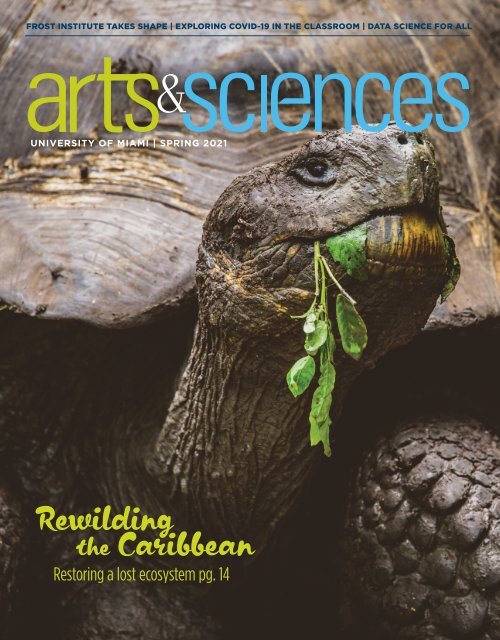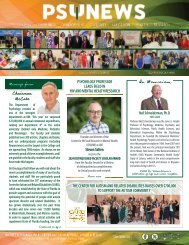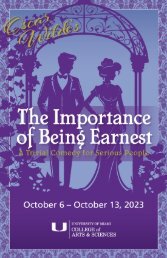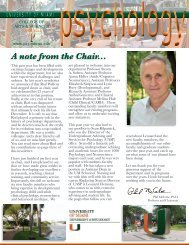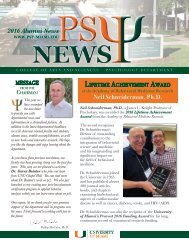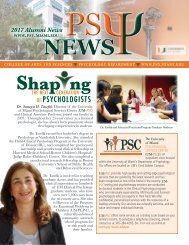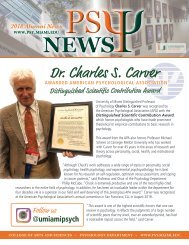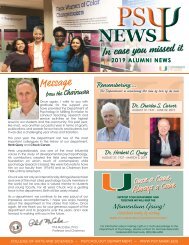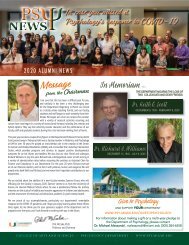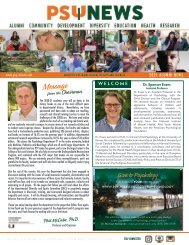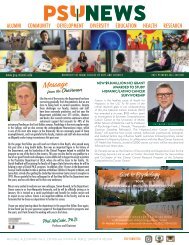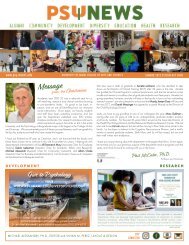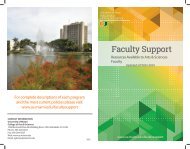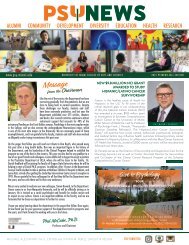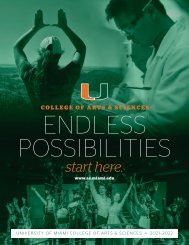College of Arts and Sciences - Spring 2021 - University of Miami
Create successful ePaper yourself
Turn your PDF publications into a flip-book with our unique Google optimized e-Paper software.
FROST INSTITUTE TAKES SHAPE | EXPLORING COVID-19 IN THE CLASSROOM | DATA SCIENCE FOR ALL<br />
UNIVERSITY OF MIAMI | SPRING <strong>2021</strong><br />
Rewilding<br />
the Caribbean<br />
Restoring a lost ecosystem pg. 14<br />
ARTS | SCIENCES 2
InsideVOLUME 22 | ISSUE 3 | ARTS & SCIENCES | SPRING <strong>2021</strong><br />
DEPARTMENTS<br />
02<br />
AROUND CAMPUS<br />
Scenes <strong>and</strong> sites on the<br />
Coral Gables campus<br />
04<br />
A&S NEWS<br />
Frost Institute construction<br />
<strong>and</strong> more A&S news<br />
10<br />
FIVE QUESTIONS<br />
Laurie Silvers, Chair <strong>of</strong> UM’s<br />
Board <strong>of</strong> Trustees<br />
12<br />
ALUMNI NEWS<br />
UM alumna joins White House<br />
communications team<br />
13<br />
MAJOR INFATUATION<br />
Students <strong>and</strong> alumni share their<br />
sentiments on psychology<br />
20<br />
CLASS SPOTLIGHT<br />
A new undergrad course<br />
decodes data science for all<br />
21<br />
STUDENT DIGEST<br />
UM senior charts her<br />
own stellar path<br />
22<br />
FACULTY CORNER<br />
A&S faculty members awarded<br />
by Faculty Senate<br />
FEATURE<br />
14<br />
REWILDING THE CARIBBEAN<br />
The restoration <strong>of</strong> a diverse isl<strong>and</strong><br />
ecosystem<br />
23<br />
PHILANTHROPY<br />
A generous gift to create a new<br />
Judge-in-Residence program<br />
24<br />
A&S RESEARCH<br />
Discovering the scientific wonders<br />
<strong>of</strong> zebrafish<br />
26<br />
BOOKMARKS<br />
A look at recent publications by<br />
A&S faculty<br />
28<br />
CLASS NOTES<br />
News <strong>and</strong> notes from our<br />
A&S alumni community<br />
32<br />
END NOTE<br />
A Constellation <strong>of</strong> Passions<br />
<strong>and</strong> Pursuits<br />
10<br />
20<br />
21<br />
24
FROM THE DEAN<br />
UNIVERSITY OF MIAMI<br />
SPRING <strong>2021</strong><br />
Dean<br />
Leonidas G. Bachas<br />
Senior Associate Deans<br />
Jennifer Ferriss-Hill<br />
Maria Galli Stampino<br />
Kenneth J. Voss<br />
Associate Deans<br />
Charles Mallery<br />
Nicole Leeper Piquero<br />
Assistant Deans<br />
Emily Long<br />
Maryann Tatum Tobin<br />
Director <strong>of</strong> Strategic Initiatives<br />
Jeanne Marie Luis<br />
Senior Business Officer<br />
Dawn Reynolds<br />
Executive Director <strong>of</strong> Development<br />
Patrick E. Stewart<br />
Project Manager <strong>and</strong> Assistant<br />
to the Dean<br />
Rose Ketlie Glemaud<br />
Editor/Writer<br />
Deseraé E. del Campo<br />
Editorial Contributors<br />
Maya Bell<br />
Brittany Bomnin<br />
Rim El Belkacemi<br />
Barbara Gutierrez<br />
David Menconi<br />
Richard Westlund<br />
Design <strong>and</strong> Layout<br />
Cowen Design, Inc.<br />
arts&sciences is produced in the fall <strong>and</strong> spring<br />
by the <strong>College</strong> <strong>of</strong> Art <strong>and</strong> <strong>Sciences</strong> Office <strong>of</strong><br />
Communications. Through the magazine, we seek<br />
to increase awareness <strong>of</strong> the <strong>College</strong>’s activities<br />
by telling the stories <strong>of</strong> faculty, staff, students, <strong>and</strong><br />
alumni. Send comments, requests for permissions<br />
to reprint material, requests for extra copies <strong>of</strong> past<br />
issues, <strong>and</strong> change-<strong>of</strong>-address notification to:<br />
<strong>College</strong> <strong>of</strong> <strong>Arts</strong> <strong>and</strong> <strong>Sciences</strong>, P.O. Box 248004<br />
Coral Gables, FL 33124-4620<br />
Telephone 305.284.2485<br />
casmagazine@miami.edu<br />
All contents © <strong>2021</strong>, <strong>University</strong> <strong>of</strong> <strong>Miami</strong>.<br />
Reproduction in whole or in part without written<br />
permission is prohibited. Visit the <strong>College</strong> <strong>of</strong> <strong>Arts</strong><br />
<strong>and</strong> <strong>Sciences</strong> online at as.miami.edu<br />
Past issues <strong>of</strong> the magazine are<br />
available online at: as.miami.edu<br />
Dear Friends,<br />
By any measure, the past year has been a<br />
time <strong>of</strong> unprecedented uncertainty, tragedy,<br />
<strong>and</strong> challenge. But it has also illuminated the<br />
boundless human capacity for creativity,<br />
Leonidas G. Bachas, Dean<br />
compassion, <strong>and</strong> connection—qualities the<br />
<strong>College</strong> <strong>of</strong> <strong>Arts</strong> <strong>and</strong> <strong>Sciences</strong><br />
<strong>College</strong> <strong>of</strong> <strong>Arts</strong> <strong>and</strong> <strong>Sciences</strong> has witnessed<br />
<strong>and</strong> fostered in abundant measure throughout this difficult time.<br />
In light <strong>of</strong> our ambitious educational <strong>and</strong> research missions, the dedication <strong>and</strong><br />
ingenuity <strong>of</strong> our <strong>College</strong> community, <strong>and</strong> the scope <strong>and</strong> quality <strong>of</strong> our programs <strong>and</strong><br />
initiatives, it is perhaps not a complete surprise that our educational <strong>and</strong><br />
intellectual pursuits would thrive even amid a devastating p<strong>and</strong>emic. Still, it is with<br />
special pride that we reflect on our institutional resilience <strong>and</strong> impressive recent<br />
achievements. Our faculty, students, <strong>and</strong> staff truly rose to the challenge, exp<strong>and</strong>ing<br />
knowledge <strong>and</strong> advancing our work in an array <strong>of</strong> inspiring ways.<br />
As we joyfully prepare for the first in-person Commencement ceremonies to be<br />
held since the p<strong>and</strong>emic brought normal life to a halt, we are delighted to share with<br />
you some <strong>of</strong> our activities over the past several months. In these pages, for example,<br />
you’ll see the progress on the highly anticipated Frost Institute <strong>of</strong> Chemistry <strong>and</strong><br />
Molecular Science, designed in every detail to elevate STEM research <strong>and</strong> discovery.<br />
You’ll meet the dedicated biology pr<strong>of</strong>essor <strong>and</strong> conservationist <strong>and</strong> student team<br />
embarking on an ingenious project to revitalize a precious ecosystem. You’ll read<br />
about new courses to introduce students to the complex nature <strong>of</strong> viruses <strong>and</strong> the<br />
influential field <strong>of</strong> data science. And you’ll get a peek at a project, spearheaded by<br />
one <strong>of</strong> our most dynamic art historians, to broaden access to a magnificent trove <strong>of</strong><br />
creative works from an acclaimed artist <strong>of</strong> color.<br />
Looking ahead, the <strong>College</strong>’s mission to prepare students for productive lives <strong>and</strong><br />
successful careers in an ever-changing world remains our greatest responsibility.<br />
With your ongoing support, we will continue to pursue opportunities to make the<br />
world a healthier, more vibrant, <strong>and</strong> more equitable place amid both current <strong>and</strong><br />
future challenges. As always, we are pr<strong>of</strong>oundly grateful for your engagement with<br />
<strong>and</strong> commitment to the <strong>College</strong> <strong>of</strong> <strong>Arts</strong> <strong>and</strong> <strong>Sciences</strong>.<br />
Sincerely,<br />
Leonidas G. Bachas<br />
Make a difference.<br />
Your gift to the <strong>College</strong> <strong>of</strong> <strong>Arts</strong> <strong>and</strong> <strong>Sciences</strong> helps us<br />
support student scholarships <strong>and</strong> retain leading faculty.<br />
as.miami.edu/donate<br />
ARTS | SCIENCES 1
Around Campus<br />
2<br />
SPRING <strong>2021</strong>
SWEET CAMPUS VIBES<br />
Students wait their turn to grab a tasty<br />
treat on the Coral Gables campus.<br />
Photo: Evan Garcia/<strong>University</strong> <strong>of</strong> <strong>Miami</strong><br />
ARTS | SCIENCES 3
A|SNEWS<br />
A&SNEWS<br />
Since arriving at the <strong>University</strong> <strong>of</strong> <strong>Miami</strong> a<br />
decade ago, Leonidas G. Bachas, dean <strong>of</strong> the<br />
<strong>College</strong> <strong>of</strong> <strong>Arts</strong> <strong>and</strong> <strong>Sciences</strong>, has dreamed<br />
<strong>of</strong> a research center where world-class<br />
chemists <strong>and</strong> molecular scientists could<br />
work with experts from other disciplines to<br />
tackle a myriad <strong>of</strong> global challenges, from clean water <strong>and</strong><br />
disease to energy <strong>and</strong> food production.<br />
Now, the analytical <strong>and</strong> biological chemist’s dream is<br />
literally becoming concrete. Recently, a convoy <strong>of</strong> trucks<br />
rumbled to the construction site <strong>of</strong> the Frost Institute <strong>of</strong><br />
Chemistry <strong>and</strong> Molecular Science (FICMS) to deliver the<br />
40 loads <strong>of</strong> concrete that now form the second-floor deck<br />
<strong>of</strong> the five-story wet-lab facility rising just east <strong>of</strong> the<br />
McLamore Fountain on Memorial Drive.<br />
Following three years <strong>of</strong> planning <strong>and</strong> design, <strong>and</strong><br />
months <strong>of</strong> site preparation, construction on the $60<br />
million project—the first <strong>of</strong> a planned group <strong>of</strong> interdisciplinary<br />
research centers that will operate under the Frost<br />
Institutes for Science <strong>and</strong> Engineering umbrella—began<br />
last October <strong>and</strong> is moving apace to open in the summer <strong>of</strong><br />
2022. The highest floor deck, for a mechanical penthouse<br />
above the fifth floor, is slated to be poured this spring.<br />
Both the ro<strong>of</strong> <strong>and</strong> the skin <strong>of</strong> the nearly 94,000-squarefoot<br />
building, which will be encased in precast concrete<br />
<strong>and</strong> impact-resistant glass panels, is scheduled to be in<br />
place this fall.<br />
“Completion is over a year away, but to watch the<br />
progress from my window is very gratifying,” says Bachas,<br />
interim director <strong>of</strong> both the FICMS <strong>and</strong> Frost Institutes<br />
INAUGURAL FROST INSTITUTE<br />
TAKES SHAPE<br />
4<br />
SPRING <strong>2021</strong>
umbrella, whose <strong>of</strong>fice in the Ashe Administration Building<br />
overlooks the construction site. “It is hard to overstate<br />
the role this building will play in moving discovery science<br />
forward. Not only will it help attract the kind <strong>of</strong> top<br />
scientists we are looking for—people who are creative,<br />
innovative, <strong>and</strong> infused with an interdisciplinary spirit—<br />
but it will attract graduate <strong>and</strong> undergraduate students<br />
for the opportunity to work in the labs <strong>of</strong> renown chemists<br />
<strong>and</strong> molecular researchers.”<br />
A key initiative <strong>of</strong> the strategic Roadmap to Our<br />
New Century, the Frost Institutes took flight in<br />
2017 when the <strong>University</strong>’s longtime benefactors,<br />
Phillip <strong>and</strong> Patricia Frost, announced a l<strong>and</strong>mark<br />
$100 million gift to create a multidisciplinary<br />
research hub focused on scientific discovery.<br />
Jeffrey Duerk, the <strong>University</strong>’s executive vice<br />
president for academic affairs <strong>and</strong> provost, noted<br />
that the inaugural institute’s location underscores<br />
the importance <strong>of</strong> its mission.<br />
“Chemistry <strong>and</strong> molecular science give rise to<br />
everything that we can see <strong>and</strong> touch, from the<br />
air we breathe, to our thoughts, to the objects we<br />
use daily—from our cells to our cellphones,” Duerk<br />
says. “From the emerging COVID vaccines to the<br />
microchips in our laptops, our lives are shaped by<br />
chemistry <strong>and</strong> molecular science. Because they<br />
are both central to so many fields <strong>and</strong> pervasive in<br />
their impact, it’s fitting that the first <strong>of</strong> the Frost<br />
Institutes is rising at the center <strong>of</strong> the Coral Gables<br />
campus, where it will propel the <strong>University</strong>’s<br />
trajectory as a leader in STEM research, education,<br />
<strong>and</strong> interdisciplinary discovery.”<br />
Exactly what research will be pursued in the<br />
building, which initially will include 15,000<br />
square feet <strong>of</strong> wet-lab space on the third floor,<br />
will depend largely on the vision <strong>of</strong> the inaugural<br />
director, who is expected to be in place by this<br />
summer. For now, a faculty member is on board,<br />
<strong>and</strong> there are plans to hire more than a dozen<br />
faculty members who will also teach across<br />
the <strong>University</strong>.<br />
As such, Duerk, Bachas, <strong>and</strong> other members <strong>of</strong> the<br />
steering committee, who helped guide the FICMS’s design,<br />
have ensured that the L-shaped structure will have<br />
the flexibility to meet the needs <strong>of</strong> a multitude <strong>of</strong><br />
The Frost Institute <strong>of</strong> Chemistry <strong>and</strong> Molecular Science<br />
is on pace to open in the summer <strong>of</strong> 2022.<br />
interdisciplinary researchers now <strong>and</strong> in the future.<br />
Designed by Harvard Jolly Architecture, a Florida firm<br />
with expertise in higher education, <strong>and</strong> constructed<br />
by Skanska, a global firm that built the award-winning<br />
Frost School <strong>of</strong> Music’s Patricia Louise Frost Studios, the<br />
FICMS has an open design, with moveable wet-lab benches<br />
<strong>and</strong> fixtures, allowing for the free flow <strong>of</strong> both ideas <strong>and</strong><br />
people. The building is also designed to achieve, at the<br />
minimum, a silver rating from the Leadership in Energy<br />
<strong>and</strong> Environmental Design (LEED) green building<br />
certification program.<br />
As the <strong>University</strong>’s research endeavors grow, the FICMS<br />
will also have room to exp<strong>and</strong>. When the building opens,<br />
the fourth <strong>and</strong> fifth floors will remain empty shells. Eventually,<br />
each will accommodate another 15,000-square-feet<br />
<strong>of</strong> wet-lab space. The first floor will primarily be a public<br />
space, featuring a great hall <strong>and</strong> seminar rooms. But it also<br />
will have a microscopy imaging suite, where researchers can<br />
examine biological <strong>and</strong> other materials at the nanoscale.<br />
For example, they can determine the suitability <strong>of</strong> those<br />
materials for biomedical devices or energy-storage<br />
applications.<br />
And the second floor, the site <strong>of</strong> the building’s first major<br />
concrete pour, will house the director’s <strong>of</strong>fice <strong>and</strong><br />
innovation labs, where faculty members from across the<br />
<strong>University</strong> can take up residence for an extended period to<br />
collaborate on synergistic research.<br />
But Bachas is not waiting for the FICMS to inspire such<br />
collaborations. To date, the institute has awarded four<br />
seed grants to junior faculty members who teamed up with<br />
senior faculty members to pursue new research in molecular<br />
science that could lead to grants <strong>and</strong> publications. Their<br />
topics include molecular systems for targeted drug delivery,<br />
tissue-like electrical conducting materials, the role <strong>of</strong> metals<br />
in the progression <strong>of</strong> neurodegenerative diseases, <strong>and</strong> the<br />
prediction <strong>of</strong> protein structure for drug design. n<br />
ARTS | SCIENCES 5
A|SNEWS<br />
A&SNEWS<br />
We need to talk<br />
Online program led by UM psychology<br />
pr<strong>of</strong>essor assists troubled couples.<br />
A<br />
cross a broad array <strong>of</strong><br />
institutions <strong>and</strong> businesses,<br />
the COVID-19 p<strong>and</strong>emic<br />
shutdown caused unprecedented<br />
disruptions <strong>and</strong> challenges.<br />
But some enterprises that were<br />
already operating online continued<br />
without a hitch—<strong>and</strong> even saw<br />
dem<strong>and</strong> for their services increase.<br />
One <strong>of</strong> them is OurRelationship.com,<br />
an online marital counseling program<br />
founded <strong>and</strong> overseen by UM<br />
psychology pr<strong>of</strong>essor Brian Doss.<br />
“Beyond the usual difficulties <strong>of</strong>ten<br />
faced by couples, the p<strong>and</strong>emic has<br />
triggered a lot <strong>of</strong> additional stressors,”<br />
Doss says. “People are having to<br />
renegotiate family roles, work-life<br />
balance, <strong>and</strong> other issues.<br />
“Because we can do everything<br />
remotely, our service delivery model<br />
makes more sense than ever these<br />
days,” he notes. “Our clients could<br />
access continuous services from their<br />
own homes, without interruption,<br />
when in-person workshops were<br />
impossible.”<br />
Created by Doss ten years ago to<br />
assist low-income couples unable or<br />
reluctant to avail themselves <strong>of</strong><br />
in-person sessions, OurRelationship.<br />
com is promoted through social<br />
media <strong>and</strong> online advertising, appearing<br />
in results for searches on terms<br />
such as “free marriage counseling.”<br />
The program now employs 15 online<br />
counseling coaches, some <strong>of</strong> them UM<br />
doctoral students in clinical psychology.<br />
Working eight to ten hours per<br />
week, the coaches provide 20-minute<br />
virtual counseling sessions to complement<br />
eight hours <strong>of</strong> online content.<br />
Flexible hours accommodate couples’<br />
work schedules.<br />
Funded by grants from the National<br />
Institute <strong>of</strong> Health <strong>and</strong> the Administration<br />
for Children <strong>and</strong> Families,<br />
OurRelationship.com has served some<br />
2,000 couples <strong>and</strong> individuals in all<br />
50 states, D.C., Guam, <strong>and</strong> Puerto<br />
Rico. With a new five-year grant<br />
from the NIH children <strong>and</strong> families<br />
program, Doss expects that figure to<br />
double.<br />
OurRelationship.com has also<br />
attracted interest from the U.S. armed<br />
services, making outreach to veteran<br />
<strong>and</strong> active-duty military couples a<br />
new priority. “The military is excited<br />
about the program as an option for<br />
deployed couples coping with multiple<br />
stresses,” Doss says. “Factoring<br />
in time differences when scheduling<br />
coaching calls for far-flung couples<br />
can be a challenge. But with coaches<br />
on both coasts, we can usually work<br />
it out.”<br />
Doss reports that the program<br />
improves individual as well as<br />
relationship well-being. The beneficial<br />
impact tends to be long-lasting,<br />
persisting for a year or more.<br />
“Anecdotally, we have seen an<br />
increase in the number <strong>of</strong> couples<br />
seeking a program like ours,<br />
especially with a lot <strong>of</strong> other things<br />
not being available,” says Doss. “More<br />
than a year into the p<strong>and</strong>emic, a lot<br />
<strong>of</strong> therapists have adapted with<br />
telehealth, so we may not have quite<br />
as unique a niche as we used to. Zoom<br />
fatigue is also a real factor these days.<br />
“Overall, however, people have<br />
become more comfortable seeking out<br />
these kinds <strong>of</strong> services online—<strong>and</strong><br />
that is to everyone’s benefit.”<br />
For more information about Brian<br />
Doss <strong>and</strong> other psychology faculty<br />
research, visit psy.miami.edu. n<br />
6<br />
SPRING <strong>2021</strong>
Mighty—<br />
But Not Always Malevolent<br />
New biology course explores viruses<br />
<strong>and</strong> their varied impact<br />
A<br />
ffecting life in every corner <strong>of</strong> the globe, viruses<br />
are the focus <strong>of</strong> a new Department <strong>of</strong> Biology<br />
course that attracted many students this spring.<br />
According to assistant pr<strong>of</strong>essor Cynthia<br />
Silveira, “The Biology <strong>of</strong> Viruses” examines the complex<br />
nature <strong>of</strong> viruses as biological entities—an inquiry that has<br />
gained extraordinary relevance during a global p<strong>and</strong>emic.<br />
“The Biology <strong>of</strong> Viruses is not a typical virology course,<br />
which would study viruses as mere pathogens,” says<br />
Silveira. “Viruses are integral parts <strong>of</strong> ecosystems <strong>and</strong><br />
organisms. We are studying their molecular biology, their<br />
ecology, <strong>and</strong> how their interactions with cellular<br />
organisms shape the evolution <strong>of</strong> life itself.”<br />
In development before the novel coronavirus emerged,<br />
the course has since been altered to address concerns <strong>and</strong><br />
questions about the SARS-CoV-2 pathogen.<br />
“This course has given me a new perspective on viruses,”<br />
says senior Aloki Patel, who is majoring in biology <strong>and</strong><br />
criminology, with minors in chemistry <strong>and</strong> exercise<br />
physiology. “Especially during these unprecedented times,<br />
the course is extremely relevant <strong>and</strong> provides thorough<br />
information on viruses as fast-evolving ‘biological entities.’<br />
“It has definitely increased my underst<strong>and</strong>ing <strong>of</strong> how<br />
viruses interact with humans <strong>and</strong> other animals.”<br />
The coronavirus p<strong>and</strong>emic serves as a compelling<br />
real-time case study for the students to recognize <strong>and</strong><br />
analyze a viral phenomenon <strong>and</strong> its impact on humans.<br />
Viruses are best known for their role in plagues but—as<br />
fundamental components <strong>of</strong> biology—they also serve<br />
important <strong>and</strong> <strong>of</strong>ten beneficial roles in human life.<br />
“Among the most surprising things students learn is<br />
that a large fraction <strong>of</strong> the human genome is composed <strong>of</strong><br />
viruses that became incorporated in the genomes <strong>of</strong> our<br />
For more information<br />
about the Department<br />
<strong>of</strong> Biology, visit<br />
biology.as.miami.edu<br />
ancestors,” Silveira says. “Some <strong>of</strong> these viral genomes<br />
gave origin to genes that, for example, form the placenta<br />
<strong>and</strong> participate in memory storage.”<br />
Silveira ensures that students take an active role in<br />
learning about viruses by providing them with an array<br />
<strong>of</strong> tools <strong>and</strong> research methods to underst<strong>and</strong> the multifaceted<br />
nature <strong>of</strong> these tiny but powerful entities. At the<br />
start <strong>of</strong> the semester, students were given a genome in the<br />
form <strong>of</strong> a digital file, <strong>and</strong> every week they learn a different<br />
bioinformatic tool with which to study it. The goal is for<br />
students to develop different methods <strong>and</strong> approaches to<br />
navigate, process, <strong>and</strong> underst<strong>and</strong> the information <strong>and</strong><br />
eventually reach their own conclusions about the genome<br />
they studied.<br />
“Having a background<br />
on the structure <strong>and</strong> activity<br />
<strong>of</strong> viruses will provide<br />
me with much-needed<br />
insight as I prepare<br />
for my master’s degree<br />
in public health,’’ says<br />
Alex<strong>and</strong>rea Masocco, a<br />
senior who is double-majoring in biology, <strong>and</strong> religion <strong>and</strong><br />
health care. “It’s really great that the <strong>University</strong> is <strong>of</strong>fering<br />
this class, especially during a p<strong>and</strong>emic.<br />
“The more we underst<strong>and</strong> viruses, the more knowledge<br />
we can apply to diseases <strong>and</strong> treatments.” n<br />
ARTS | SCIENCES 7
A&SNEWS<br />
Elevating Indigenous voices<br />
UM senior shares experience from new course <strong>of</strong>fered in Native American <strong>and</strong><br />
Global Indigenous Studies program.<br />
The <strong>University</strong> <strong>of</strong> <strong>Miami</strong>’s new multidisciplinary Native American <strong>and</strong> Global Indigenous Studies<br />
program strives to elevate students’ underst<strong>and</strong>ing <strong>of</strong> the unique histories <strong>and</strong> perspectives <strong>of</strong><br />
Native communities. The NAGIS program <strong>of</strong>fered its first course this spring, “Introduction to<br />
Native <strong>and</strong> Indigenous Peoples <strong>and</strong> Perspectives,” taught by <strong>Miami</strong> Law alumna Caroline LaPorte,<br />
a judicial advisor for the Seminole Tribe <strong>of</strong> Florida <strong>and</strong> an immediate descendant <strong>of</strong> the Little River B<strong>and</strong><br />
<strong>of</strong> the Ottawa Indians (Bear Clan) <strong>of</strong> Manistee, Michigan. Natalia Brown, a senior majoring in Ecosystem<br />
Science <strong>and</strong> Policy, took the course this spring <strong>and</strong> shares her perspective on how it impacted her.<br />
A&S News: Why did you decide to take this course?<br />
NB: My research interests on issues <strong>of</strong> energy justice <strong>and</strong> environmental<br />
health are inextricably linked to the scholarship <strong>and</strong> grassroots activist<br />
traditions <strong>of</strong> Native American <strong>and</strong> global Indigenous populations.<br />
Beyond my own independent studies, I’ve never taken a formal class on<br />
the ways in which Native peoples are experiencing <strong>and</strong> conceptualizing<br />
these struggles, so this class immediately caught my eye!<br />
A&S News: How has the course impacted you?<br />
NB: Most importantly, the course made me realize that one class on these<br />
issues is not nearly enough. I have learned a great deal about my own<br />
positionality <strong>and</strong> privilege while gaining a more nuanced underst<strong>and</strong>ing<br />
<strong>of</strong> the sociohistorical context that we are living in.<br />
A&S News: Would you recommend this course to other UM<br />
students?<br />
NB: Yes! I highly recommend the class. It was the perfect mix <strong>of</strong> intellectual<br />
challenge <strong>and</strong> self-reflection for future growth. It’s relevant for all<br />
students, <strong>and</strong> it provides a great first stepping stone for us to have more<br />
conversations about accountability <strong>and</strong> equity as members <strong>of</strong> the<br />
<strong>University</strong> <strong>of</strong> <strong>Miami</strong> community. n<br />
8<br />
SPRING <strong>2021</strong><br />
Artwork by Caroline LaPorte
Photos courtesy <strong>of</strong> Léo Holder <strong>and</strong> the Ge<strong>of</strong>frey Holder Estate<br />
Accessing the personal, archival collection<br />
<strong>of</strong> actor, dancer, composer, choreographer,<br />
<strong>and</strong> painter Ge<strong>of</strong>frey Holder.<br />
The Ge<strong>of</strong>frey Holder Project<br />
Throughout his enriched life<br />
as a performer <strong>and</strong> artist,<br />
Ge<strong>of</strong>frey Holder collected<br />
hundreds <strong>of</strong> mementoes,<br />
artwork, <strong>and</strong> keepsakes that could fill<br />
a warehouse. And he did—a 1,200-<br />
sq.-ft., climate-controlled warehouse<br />
in New Jersey preserved by his son,<br />
Léo Holder, to be exact.<br />
“Among his many talents, Holder<br />
was an incredible archivist,” says Art<br />
<strong>and</strong> Art History Pr<strong>of</strong>essor Erica Moiah<br />
James. “He literally had warehouses<br />
where he kept all <strong>of</strong> his collections,<br />
costumes, papers, videos, <strong>and</strong> <strong>of</strong><br />
course his artwork. He had such a<br />
complete life <strong>and</strong> knew that his life<br />
could teach others.”<br />
Now, with the help <strong>of</strong> a $200,000<br />
Mellon Foundation grant <strong>and</strong> the<br />
determination <strong>of</strong> Pr<strong>of</strong>essor James,<br />
Ge<strong>of</strong>frey Holder’s creative world will<br />
be available to scholars <strong>and</strong> the public<br />
through a new digital platform <strong>and</strong><br />
print publication focusing on<br />
Holder’s life <strong>and</strong> his<br />
artistic influences.<br />
“I’m interested<br />
in African<br />
diasporic arts, which doesn’t include<br />
only people <strong>of</strong> African descent but<br />
people who engage within that imaginary,”<br />
says James. “We know as<br />
scholars that accessibility to archival<br />
information is very limited in the Caribbean,<br />
so when it came to accessing<br />
Holder’s art <strong>and</strong> personal collection,<br />
we wanted to think about different<br />
ways in which we could deliver African<br />
diaspora scholarship to transform the<br />
conversation about Holder’s work as a<br />
multi-modal, interdisciplinary artist.”<br />
Ge<strong>of</strong>frey Holder was a<br />
man <strong>of</strong> tremendous talent.<br />
Born in Port <strong>of</strong> Spain, Trinidad<br />
<strong>and</strong> Tobago, Holder embodied<br />
the life <strong>of</strong> an artist who displayed<br />
an artistic awakening<br />
as a<br />
Caribbean<br />
creative within the<br />
African diaspora <strong>and</strong><br />
global black arts<br />
movement. Holder, who<br />
starred on Broadway <strong>and</strong><br />
choreographed original works<br />
for companies like the Alvin Ailey<br />
American Dance Theatre, also starred<br />
in Hollywood films like “Live <strong>and</strong> Let<br />
Die” <strong>and</strong> “Annie.” In 1974, he won<br />
a Tony Award for best director <strong>and</strong><br />
costume designer for the original<br />
Broadway production <strong>of</strong> “The Wiz.”<br />
James, with the Holder family <strong>and</strong><br />
researcher, Dr. Daniela Fifi, will<br />
organize the archive by making the<br />
items from Holder’s collection accessible<br />
to scholars <strong>and</strong> the public. The<br />
collection will be administered under<br />
the <strong>University</strong> <strong>of</strong> <strong>Miami</strong>’s Center for<br />
Global Black Studies. “The aim is to<br />
give a fresh <strong>and</strong> critical<br />
perspective into<br />
Holder’s life as an<br />
artist, dancer, <strong>and</strong><br />
performer for not only<br />
scholars<br />
interested in<br />
his work<br />
but also for the<br />
public <strong>and</strong><br />
students<br />
here at<br />
UM who can<br />
learn a<br />
great deal<br />
about per-<br />
severance<br />
<strong>and</strong> the<br />
capacity<br />
<strong>of</strong> art to<br />
transform<br />
lives <strong>and</strong><br />
perhaps<br />
worlds,” says<br />
James. n<br />
ARTS | SCIENCES 9
1. What are your top priorities<br />
as Chair <strong>of</strong> UM’s Board <strong>of</strong><br />
Trustees?<br />
As Chair <strong>of</strong> the Board, I will<br />
aggressively support the <strong>University</strong>’s<br />
continuing commitment to academic<br />
excellence <strong>and</strong> outst<strong>and</strong>ing healthcare.<br />
We are an exceptional<br />
institution with some <strong>of</strong> the very best<br />
<strong>and</strong> brightest stars among our faculty<br />
<strong>and</strong> students. I see my obligation to<br />
do whatever I can to promote our<br />
status as a highly respected<br />
institution <strong>and</strong> to provide a clear<br />
path forward to grow even brighter.<br />
2. Where do you see UM in the<br />
next 10 years <strong>and</strong> what excites<br />
you most about the <strong>University</strong>’s<br />
future?<br />
We are a comparably young university<br />
<strong>and</strong> as a result there is an excitement<br />
<strong>and</strong> energy to what is possible. Our<br />
past is a springboard to our future—<br />
the future <strong>of</strong> creating new forms <strong>of</strong><br />
teaching <strong>and</strong> research; the future <strong>of</strong><br />
new forms <strong>of</strong> healthcare; the future<br />
<strong>of</strong> creating <strong>and</strong> molding graduates<br />
who are innovative <strong>and</strong> bold. That is<br />
where I want UM to be in ten years<br />
<strong>and</strong> beyond.<br />
3. As an <strong>Arts</strong> <strong>and</strong> <strong>Sciences</strong><br />
alumna, what do you see as<br />
the value <strong>of</strong> an arts <strong>and</strong> sciences<br />
education in the 21st century?<br />
Education is a multi-faceted<br />
experience. An arts <strong>and</strong> sciences<br />
education exposes students to a world<br />
<strong>of</strong> diverse thoughts <strong>and</strong> ideas, which<br />
promotes the development <strong>of</strong> a wellrounded<br />
intellectual perspective. At<br />
UM, we are committed to making this<br />
a significant goal for every student <strong>and</strong><br />
have developed innovative programs<br />
<strong>and</strong> curricula to promote these<br />
initiatives.<br />
4. Why is civic <strong>and</strong> social<br />
engagement necessary for<br />
women today who are shifting<br />
their roles from volunteers to<br />
philanthropists <strong>and</strong> donating not<br />
only their time but their money<br />
to help different causes?<br />
Women today have opportunities that<br />
were not available in the recent past. As<br />
a result, we have become significant<br />
influencers in all areas <strong>of</strong><br />
contemporary society. To be best<br />
equipped to successfully maneuver as<br />
leaders, women need to have an<br />
underst<strong>and</strong>ing as to what they can do<br />
to influence as well as support causes<br />
they care about. Shifting from<br />
volunteer to philanthropist allows a<br />
further degree <strong>of</strong> support to ensure that<br />
charitable causes are stable <strong>and</strong><br />
sustained.<br />
LAURIE<br />
SILVERS<br />
Psychology Major, ’74<br />
Media Entrepreneur<br />
<strong>and</strong> Chair <strong>of</strong> UM Board <strong>of</strong> Trustees<br />
5. Over the years, you have made<br />
impactful gifts to the <strong>University</strong><br />
<strong>of</strong> <strong>Miami</strong>. Would you please help<br />
us underst<strong>and</strong> what motivated<br />
you to make each gift? When it<br />
comes to our graduates <strong>and</strong> their<br />
prospects for the future, what<br />
advice would you <strong>of</strong>fer them?<br />
Every gift I have made to the<br />
<strong>University</strong> <strong>of</strong> <strong>Miami</strong> has been made<br />
with the single goal <strong>of</strong> supporting the<br />
best educational opportunities for our<br />
students. Whether it has been to<br />
provide scholarships, funding to<br />
attract faculty scholars or innovative<br />
research—all have been made with<br />
this one goal in mind.<br />
When our students graduate from<br />
the <strong>University</strong> <strong>of</strong> <strong>Miami</strong>, they leave<br />
with an incredible education that will<br />
prepare them for a successful future.<br />
I am an entrepreneur so I always<br />
look at how I can influence change.<br />
If I can <strong>of</strong>fer one piece <strong>of</strong> advice for<br />
our graduates it would be to embrace<br />
change, look beyond the obvious <strong>and</strong><br />
go for what you believe in. That will<br />
give your life meaning <strong>and</strong> no matter<br />
where you go <strong>and</strong> what you do, you<br />
will have taken your own path to<br />
get there.<br />
QUESTIONS<br />
Lib<br />
10 SPRING <strong>2021</strong>
Liberal Studies<br />
Latin American Studies<br />
Global Health<br />
Data Science<br />
International Adminstration<br />
Security Management<br />
Go anywhere<br />
from HERE<br />
EXPLORE INTERDISCIPLINARY CONNECTIONS AT A RT S & SCIEN C E S<br />
> One-year master's degrees<br />
> Evening <strong>and</strong> online courses<br />
> Speciality tracks <strong>and</strong> industry internships<br />
> Select tuition waivers for UM alumni<br />
> Accelerated Bachelor's to Master's options<br />
> Other degree programs available<br />
NO GRE<br />
REQUIRED<br />
www.ips.as.miami.edu | ips<strong>of</strong>fice@miami.edu |<br />
ARTS | SCIENCES 11
ALUMNINEWS<br />
It's all about communications<br />
Alumna joins Biden’s all-women communications team<br />
In a historic move, President Joe Biden appointed an<br />
all-women senior communications team to work in<br />
his administration. The group includes <strong>University</strong> <strong>of</strong><br />
<strong>Miami</strong> alumna, Maria del Pilar “Pili” Tobar, who was<br />
named as Deputy White House Communications Director.<br />
Tobar graduated from the <strong>University</strong> <strong>of</strong> <strong>Miami</strong> in 2009<br />
with a double major in motion pictures <strong>and</strong> political<br />
science. In 2010, she earned a Master in Public Administration<br />
(MPA) from the <strong>College</strong> <strong>of</strong> <strong>Arts</strong> <strong>and</strong> <strong>Sciences</strong>.<br />
“I’m honored to have the opportunity to serve alongside<br />
this group <strong>of</strong> women. They are a talented, experienced, <strong>and</strong><br />
knowledgeable group <strong>of</strong> communicators. And many <strong>of</strong> us<br />
are also moms,” says Tobar, who lives with her wife <strong>and</strong><br />
3-year-old daughter in Washington, D.C.<br />
Born in Florida <strong>and</strong> raised in part in Guatemala,<br />
Tobar traces her love <strong>of</strong> politics at the U. She became an<br />
active member <strong>of</strong> the Young Democrats <strong>and</strong> helped members<br />
<strong>of</strong> the media during former President Bill Clinton’s<br />
visit to the campus. She attended presidential debates <strong>and</strong><br />
other political events during her time on campus.<br />
“UM was such a vibrant place for politics,” she says. “My<br />
interest in political science increased when I learned how<br />
engaging people in the electoral system <strong>and</strong> making sure that<br />
they had a voice could change the lives <strong>of</strong> millions <strong>of</strong> people.”<br />
Casey Kl<strong>of</strong>stad, pr<strong>of</strong>essor <strong>of</strong> political science, was one <strong>of</strong><br />
her pr<strong>of</strong>essors. “I had the pleasure <strong>of</strong> working with Ms.<br />
Tobar when she was a UM student <strong>and</strong> later in 2012 in her<br />
role as press secretary for America's Voice, an immigration<br />
reform advocacy organization,” he says. “Pili is deeply<br />
dedicated to public service, <strong>and</strong> the Department <strong>of</strong> Political<br />
Science is honored to see one <strong>of</strong> our graduates in the<br />
president’s administration."<br />
Jonathan West, pr<strong>of</strong>essor <strong>and</strong> director <strong>of</strong> the MPA<br />
program, says that he remembers her as someone who had<br />
a strong interest in American politics, communications, <strong>and</strong><br />
film. “She was a pleasure to teach, always willing to share<br />
her insights in class discussions <strong>and</strong> an excellent writer.”<br />
After getting her master’s degree, Tobar moved to<br />
Washington, D.C. where she worked for America’s Voice.<br />
She also worked for the Democratic National Committee<br />
as regional press secretary for the western region, <strong>and</strong><br />
she became communications director for the Latino<br />
Victory Project.<br />
Tobar also did stints as communications director for<br />
Congressman Ruben Gallego <strong>and</strong> media director for<br />
Senate Minority Leader Chuck Schumer, where she<br />
ensured that all senate democrats took their messages to<br />
Hispanic outlets as well as to mainstream ones. Her<br />
extensive experience got her the job <strong>of</strong> communications<br />
director for coalitions for the Biden-Harris campaign.<br />
Tobar joined a team that includes Kate Bedingfield,<br />
White House communications director; Jennifer Psaki,<br />
the administration's press secretary; Symone S<strong>and</strong>ers,<br />
Vice President Kamala Harris’ chief spokesperson; Ashley<br />
Etienne, communications director for the vice president;<br />
Karine Jean-Pierre, principal deputy press secretary; <strong>and</strong><br />
Elizabeth Alex<strong>and</strong>er, communications director to incoming<br />
First Lady Jill Biden. n<br />
12 SPRING <strong>2021</strong>
MAJORINFATUATION<br />
Discovering how humans tick is just one reason why these UM<br />
undergrads <strong>and</strong> alumni decided to major in psychology.<br />
“Psychology is the key to unlocking the synergy<br />
<strong>of</strong> neuroscience, the conscious mind, <strong>and</strong> human<br />
behavior. A psychology degree from UM gives you<br />
invaluable tools to analyze <strong>and</strong> examine phenomena<br />
on the individual, group, <strong>and</strong> societal levels in the<br />
service <strong>of</strong> a better tomorrow.”<br />
Connor Mears, Class <strong>of</strong> 2019<br />
"I love my major because it covers a broad overview<br />
<strong>of</strong> the many different fields <strong>of</strong> psychology, while<br />
giving you the flexibility to explore the realms you<br />
feel more intrigued by.”<br />
Alexis Adornato, Class <strong>of</strong> 2022<br />
“At the <strong>University</strong> <strong>of</strong> <strong>Miami</strong>, I was able<br />
to explore my interests in the major<br />
<strong>of</strong> psychology. I was able to take a<br />
variety <strong>of</strong> psychology-based classes<br />
that ultimately led me to my passion<br />
in applied behavioral psychology.”<br />
Zoë Ifill, Class <strong>of</strong> 2019<br />
“Majoring in psychology helped<br />
me figure out what I was good at<br />
<strong>and</strong> how I could use my skills <strong>and</strong><br />
experiences to make a difference<br />
in others’ lives. The best part<br />
about majoring in psychology<br />
was the connection I made with<br />
faculty members <strong>and</strong> the Child<br />
<strong>and</strong> Adolescent Mood <strong>and</strong> Anxiety<br />
Treatment Program (CAMAT).<br />
Having people in the<br />
department who believed in me<br />
<strong>and</strong> my potential <strong>and</strong> having the<br />
opportunity to participate in<br />
research, gave me the confidence<br />
<strong>and</strong> real-world experience<br />
I needed to pursue a career in<br />
clinical psychology.”<br />
Liz Halliday,<br />
Class <strong>of</strong> 2017, second-year<br />
clinical psychology PhD<br />
student<br />
"I love studying neuroscience<br />
because it has allowed me to delve<br />
into the dynamics <strong>of</strong> emotion <strong>and</strong> the<br />
role individual differences play. I have<br />
been able to continue developing my<br />
interest in neuropsychology through<br />
my research in the <strong>Miami</strong> Affective<br />
Neuroscience <strong>and</strong> Translational<br />
Experimental Enterprise (MANATEE)<br />
lab <strong>and</strong> feel excited to go further into<br />
the subject in graduate school.”<br />
Gillian Mitchell, Class <strong>of</strong> <strong>2021</strong><br />
ARTS | SCIENCES 13
NATURE'S WAY: UM students visit the Three Jays<br />
Tortoise Sanctuary where Dr. Galetti is performing<br />
experiments on seed dispersal by Galapagos tortoises.<br />
Rewilding<br />
the<br />
Caribbean<br />
UM biologist <strong>and</strong> conservationist<br />
leads collaborative initiative<br />
to restore ecosystem diversity<br />
Thous<strong>and</strong>s <strong>of</strong> years ago, the Caribbean isl<strong>and</strong>s were replete with giant tortoises, macaws, monkeys, iguanas, <strong>and</strong><br />
fruiting trees. Between overdevelopment, climate change, sea level rise, <strong>and</strong> other environmental<br />
insults, today’s Caribbean bears a pale resemblance to its lush primeval past.<br />
While the clock cannot be turned back, a biologist with the <strong>College</strong> <strong>of</strong> <strong>Arts</strong> <strong>and</strong> <strong>Sciences</strong> is taking steps toward<br />
restoring these rich isl<strong>and</strong> ecosystems through “Rewilding the Caribbean,” a collaborative initiative with long-term<br />
implications for the entire Western Hemisphere.<br />
“High rates <strong>of</strong> animal extinctions have massively disturbed the Caribbean isl<strong>and</strong>s,” says Mauro Galetti, associate<br />
pr<strong>of</strong>essor <strong>of</strong> biology <strong>and</strong> director <strong>of</strong> the John C. Gifford Arboretum. “These extinctions have far-reaching consequences<br />
for the survival <strong>of</strong> plant populations.<br />
14<br />
SPRING <strong>2021</strong>
“They may ultimately lead to a collapse <strong>of</strong> important ecosystem functions such as carbon storage, which mediates the<br />
impact <strong>of</strong> greenhouse gases.”<br />
Over the past 7,000 years, at least ten species <strong>of</strong> giant tortoises, four species <strong>of</strong> primates, several species <strong>of</strong> macaws, <strong>and</strong> ten<br />
species <strong>of</strong> giant sloths have become extinct due to human poaching <strong>and</strong> habitat loss. “The loss <strong>of</strong> the giant tortoises is particularly<br />
devastating, because they are frugivores, eating fruits <strong>and</strong> distributing the seeds throughout their habitats,” says Galetti.<br />
TURNING THE TIDE<br />
To bring back some <strong>of</strong> the Caribbean’s lost biological diversity, Galetti has launched a pilot project studying the role <strong>of</strong> giant<br />
tortoises in the germination <strong>of</strong> Caribbean plants. “The Caribbean is ideal for rewilding,” he notes, “because there are so<br />
ARTS | SCIENCES 15
Alumnus gift will enhance Arboretum<br />
UM’s John C. Gifford Arboretum is<br />
a destination not only for education<br />
<strong>and</strong> research, but reflection <strong>and</strong><br />
relaxation. A generous gift from<br />
Eric D. Brueggeman, A.B. ’13,<br />
will help revitalize the facility with<br />
new benches, an easily accessible<br />
path, water fountains, <strong>and</strong> other<br />
features.<br />
“This wonderful gift will transform<br />
the Arboretum, creating a<br />
‘must-see’ natural campus site for<br />
’Canes <strong>and</strong> the community,” Galetti says.<br />
Last fall, <strong>College</strong> <strong>of</strong> Engineering student teams, supervised<br />
by Associate Pr<strong>of</strong>essors Esber Andiroglu <strong>and</strong> Matthew Trussoni<br />
<strong>of</strong> the Department <strong>of</strong> Civil, Architectural <strong>and</strong> Environmental<br />
Engineering, crafted sustainable plans to attract more visitors to<br />
the Arboretum. The students’ ideas include recycled rubber<br />
pathway, benches with solar panels, <strong>and</strong> outlets to power laptops<br />
or cell phones. An outdoor pavilion could serve as a classroom<br />
<strong>and</strong> feature a ro<strong>of</strong>top lounge for visitors to appreciate the<br />
surrounding greenery.<br />
The students presented their projects to a group that<br />
included Andiroglu, Trussoni, <strong>and</strong> Galetti; Terri Hood, senior<br />
lecturer <strong>and</strong> assistant director for the undergraduate<br />
Ecosystem Science <strong>and</strong> Policy program, who maintains the<br />
Arboretum’s Sustainability Garden; <strong>and</strong> Teddy L’Houtellier,<br />
the <strong>University</strong>’s sustainability manager.<br />
“We’re discussing the students’ ideas <strong>and</strong> will be making<br />
recommendations to implement those we believe will best<br />
maintain the Gifford Arboretum’s ambience, optimize our plant<br />
collection, <strong>and</strong> respond to our visitors’ needs,” Galetti says.<br />
many isl<strong>and</strong>s where small populations <strong>of</strong> animals<br />
could be reintroduced <strong>and</strong> studied in a controlled<br />
environment.”<br />
Genetically <strong>and</strong> functionally similar to their extinct<br />
cousins, Galapagos tortoises have gaping mouths that<br />
allow them to swallow large fruits <strong>and</strong> deposit the seeds<br />
throughout their habitat.<br />
“Several plant species in the Caribbean evolved large<br />
fruits too big to be eaten by birds, <strong>and</strong> they were possibly<br />
dispersed only by giant tortoises,” Galetti says. “Seed dispersal<br />
by animals plays a prominent role in maintaining<br />
healthy tropical vegetation. In fact, 90 percent <strong>of</strong> all<br />
trees in the South American rainforest rely on<br />
vertebrates to spread their seeds.<br />
FRUITS OF THEIR LABOR<br />
To begin the rewilding project, Galetti <strong>and</strong><br />
his students measured living birds <strong>and</strong> rock<br />
iguanas as well as fossils <strong>of</strong> extinct Caribbean<br />
tortoises in the <strong>University</strong> <strong>of</strong> Florida Natural<br />
History Museum in Gainesville. Next, the<br />
team studied the size, shape,<br />
<strong>and</strong> structure <strong>of</strong> a variety <strong>of</strong><br />
tropical fruits from the Gifford<br />
Arboretum, Montgomery<br />
Botanical Center, <strong>and</strong> Fairchild<br />
Tropical Botanical Garden<br />
—“something like matching a<br />
key to a lock,” says Galetti.<br />
After identifying several types<br />
<strong>of</strong> large-seeded fruit that have<br />
grown in the Caribbean for<br />
thous<strong>and</strong>s <strong>of</strong> years, Galetti <strong>and</strong><br />
his students began feeding these<br />
fruits to Galapagos tortoises,<br />
st<strong>and</strong>ing in as extinct Caribbean<br />
giant tortoises.<br />
“We are extremely grateful to<br />
the Three Jays Tortoise Sanctuary<br />
<strong>and</strong> the Grossman family,<br />
who kindly allow us to feed their<br />
Galapagos tortoises with the<br />
Caribbean fruits,” he says.<br />
The team found that the fruit<br />
seeds that pass through the guts<br />
<strong>of</strong> a Galapagos tortoise germinate<br />
much faster than those that just l<strong>and</strong> on<br />
the ground.<br />
“For instance,” Galetti says, “the Cuban<br />
belly palm seed takes at least two years to<br />
germinate in the wild, but it can begin growing<br />
in just four weeks after being swallowed<br />
<strong>and</strong> dispersed by a tortoise. That’s a clear<br />
indicator <strong>of</strong> the importance <strong>of</strong> animals in<br />
maintaining healthy plant populations.”<br />
This summer, Galetti is planning a field<br />
trip to some Caribbean isl<strong>and</strong>s with both<br />
graduate <strong>and</strong> undergraduate students to<br />
16 1<br />
SPRING <strong>2021</strong>
“When the animals become extinct, plant populations<br />
can become confined to limited areas <strong>and</strong> lose their<br />
genetic diversity, making them vulnerable to changing<br />
climate conditions.”<br />
TEAM EFFORT: Ph.D. student,<br />
Seokmin Kim, <strong>and</strong> Dr. Galetti are<br />
leading the rewilding project. Photos:<br />
Three Jays Tortoise Sanctuary<br />
ARTS | SCIENCES 17
Your donation can help our faculty<br />
conduct research <strong>and</strong> exp<strong>and</strong><br />
learning experiences for UM students<br />
For more information, visit<br />
as.miami.edu/donate.<br />
scout potential locations for the rewilding initiative.<br />
“Rewilding is a powerful tool for nature restoration <strong>and</strong><br />
climate change mitigation,” he says.<br />
BROADENING THE FOCUS<br />
Rewilding the Caribbean involves more than just reintroducing<br />
tortoises to the isl<strong>and</strong>s. Another c<strong>and</strong>idate for<br />
increasing biodiversity is the blue <strong>and</strong> gold macaw, now<br />
found in limited numbers in South Florida. It is genetically<br />
similar to extinct species <strong>of</strong> these large, colorful birds that<br />
were once plentiful in the isl<strong>and</strong>s.<br />
“The Caribbean was home to several macaw species, but<br />
none <strong>of</strong> them survived,” Galetti says. “We have been<br />
studying the feeding habits <strong>of</strong> the macaws that live in<br />
Coral Gables to see if they would be good c<strong>and</strong>idates to<br />
replace the ecological functions <strong>of</strong> the extinct macaws.<br />
“By using remote-controlled cameras, we can see what<br />
fruits they eat <strong>and</strong> whether they drop those seeds immediately<br />
or carry them away to other locations. This will help us<br />
underst<strong>and</strong> their diets <strong>and</strong> whether an isl<strong>and</strong> habitat would<br />
support a small population <strong>of</strong> macaws over the long term.”<br />
Galetti also plans to study the rock iguana, one <strong>of</strong> the<br />
few large animals remaining in the Caribbean. Threatened<br />
by poachers, the endangered species can be found on<br />
just a h<strong>and</strong>ful <strong>of</strong> undeveloped isl<strong>and</strong>s in the Caribbean.<br />
With proper protection, this iguana can also contribute to<br />
restoring biodiversity.<br />
The potential benefits <strong>of</strong> Galetti’s research, with its<br />
collaborative embrace <strong>of</strong> citizen science, research<br />
institutions, <strong>and</strong> botanical gardens, reach beyond the<br />
Caribbean. “In the past, many types <strong>of</strong> large animals <strong>and</strong><br />
plants thrived together,” he says. “Underst<strong>and</strong>ing the interactive<br />
relationships between animals <strong>and</strong> plants is vital<br />
to increasing the biodiversity resilience in a variety <strong>of</strong><br />
tropical <strong>and</strong> subtropical habitats.” n<br />
Catesbaea spinosa, or Lily Thorn. This endemic<br />
species from Cuba <strong>and</strong> The Bahamas were<br />
potentially dispersed by extinct giant tortoises.<br />
18<br />
SPRING <strong>2021</strong>
Galapagos tortoise feeding on Theophrasta jussieui, a tree<br />
endemic to Hispaniola that was likely to be dispersed by<br />
extinct tortoises.<br />
Dr. Galetti’s collection <strong>of</strong> fruits <strong>and</strong> seeds.<br />
Scan this QR code<br />
to see a behind-the-scenes<br />
video <strong>of</strong> Dr. Galetti’s<br />
rewilding research.<br />
ARTS | SCIENCES 19
CLASSSPOTLIGHT<br />
A First Date<br />
with Data<br />
New course designed to decode data science for all<br />
From healthcare to transportation to online shopping,<br />
data permeates every aspect <strong>of</strong> modern life.<br />
Its principles <strong>and</strong> applications spur knowledge <strong>and</strong><br />
insights in a wide range <strong>of</strong> disciplines <strong>and</strong><br />
endeavors. Rather than being all about number-crunching,<br />
data analysis even has applications in the humanities.<br />
To engage <strong>and</strong> enlighten students interested in pursuing<br />
data science, the <strong>College</strong> <strong>of</strong> <strong>Arts</strong> <strong>and</strong> <strong>Sciences</strong> launched a<br />
Master <strong>of</strong> Science in Data Science program in Fall 2020.<br />
The <strong>College</strong> is now unveiling an undergraduate course in<br />
the topic with a distinctly global name: “Data Science for<br />
the World,” open to students from any major.<br />
According to the course’s creators, the sweeping scale <strong>of</strong><br />
that title is deliberate.<br />
“The main thing we want to convey about the new course<br />
is its interdisciplinary nature,” says Jerry Bonnell, a<br />
doctoral student in the Department <strong>of</strong> Computer Science,<br />
who developed the class in collaboration with Mitsunori<br />
Ogihara, a pr<strong>of</strong>essor <strong>of</strong> computer science. “We want it to<br />
be approachable from any discipline <strong>and</strong> welcoming to<br />
students from all majors.”<br />
“Data Science for the World” represents the first attempt<br />
by the department <strong>and</strong> <strong>College</strong> to <strong>of</strong>fer an introduction to<br />
data science, specifically designed for accessibility to students<br />
pursuing studies outside <strong>of</strong> the typical STEM<br />
(science, technology, engineering, <strong>and</strong> mathematics) rubric.<br />
“We hope to attract as many students as possible,<br />
because we believe data science is becoming a fundamental<br />
skill in the future job market,” says Ogihara. “Students will<br />
leave the course with new knowledge on how to engage<br />
with data <strong>and</strong> a set <strong>of</strong> tools they can use in their studies<br />
<strong>and</strong> careers.<br />
“Our goal is to draw from as many real-world examples <strong>and</strong><br />
settings as we can—<strong>and</strong> to have some fun along the way.”<br />
In that spirit, course assignments, topics, <strong>and</strong> projects<br />
will include a case study <strong>of</strong> football statistics, inspired by<br />
the “Deflategate” controversy stemming from a 2014 New<br />
Engl<strong>and</strong> Patriots NFL game; financial analysis <strong>of</strong> stock<br />
market prices; Harvard <strong>University</strong> admissions data broken<br />
out by race; a novel approach to visualizing data scales;<br />
a data-driven approach to analyzing the popular fantasy<br />
game “Dungeons <strong>and</strong> Dragons”; <strong>and</strong> the use <strong>of</strong> regression<br />
analysis to predict everything from Old Faithful eruptions<br />
at Yellowstone National Park to Spotify music stream<br />
popularity.<br />
“Data science does some <strong>of</strong> its best work when it<br />
reaches beyond its own discipline,” Bonnell says, noting its<br />
applications for liberal arts disciplines such as the classics,<br />
history, <strong>and</strong> literature. “For example, for scholars studying<br />
the works <strong>of</strong> Shakespeare <strong>and</strong> <strong>of</strong> authors <strong>of</strong> the ancient<br />
world such as Homer <strong>and</strong> Virgil, the body <strong>of</strong> available texts<br />
can be so large that no one can possibly read them all.<br />
Data tools such as textual analysis provide new lenses with<br />
which to broaden perspective <strong>and</strong> deepen underst<strong>and</strong>ing.”<br />
If the course goes as Ogihara <strong>and</strong> Bonnell hope, students<br />
drawn from an array <strong>of</strong> academic programs <strong>and</strong> majors<br />
will come away prepared to apply data analysis to a wide<br />
range <strong>of</strong> situations. It will also inspire students intrigued<br />
by the power <strong>of</strong> data to dig deeper.<br />
“Sitting at the intersection <strong>of</strong> computer science <strong>and</strong> other<br />
departments, the course will serve as a conduit to more<br />
advanced classes such as statistical learning <strong>and</strong> the computational<br />
sciences,” Bonnell says.<br />
“By providing that bridge for students, I think we’ll<br />
achieve something great.” To learn more about the<br />
Department <strong>of</strong> Computer Science, visit csc.as.miami.edu. n3<br />
20<br />
SPRING <strong>2021</strong>
STUDENTDIGEST<br />
Laws in Space<br />
<strong>University</strong> <strong>of</strong> <strong>Miami</strong> senior sets sights on<br />
far-reaching legal specialty<br />
F<br />
or most <strong>of</strong> us, outer space is quite<br />
distant from our daily lives—but<br />
not for <strong>University</strong> senior <strong>and</strong> aspiring<br />
space lawyer Tuana Yazici.<br />
Comprising international <strong>and</strong><br />
domestic agreements, rules, <strong>and</strong><br />
principles, space law addresses<br />
issues such as space exploration,<br />
damage liability, rescue efforts, environmental preservation,<br />
information sharing, <strong>and</strong> ethics. Her sights<br />
set firmly on the field, Yazici has found the U a stellar<br />
environment for her course <strong>of</strong> study.<br />
With an Independent major in PPE (Philosophy,<br />
Politics, Economics) <strong>and</strong> a minor in psychology, Yazici<br />
is taking 27 credits this spring. The ambitious trajectory<br />
will allow her to graduate in May—a whole year earlier<br />
than expected.<br />
The <strong>University</strong> <strong>of</strong> <strong>Miami</strong> did not have<br />
a PPE major when Yazici enrolled, so she<br />
set about creating it. She modeled the<br />
curriculum on a course she had taken at<br />
Oxford <strong>University</strong> <strong>and</strong>, with the help <strong>of</strong><br />
<strong>University</strong> faculty, structured the major<br />
to fulfill her desired criteria.<br />
Yazici credits Jennifer Ferriss-Hill,<br />
senior associate dean for academic<br />
affairs in the <strong>College</strong> <strong>of</strong> <strong>Arts</strong> <strong>and</strong> <strong>Sciences</strong>,<br />
for making it possible to realize her<br />
academic goals. “Dean Ferriss-Hill was<br />
not only involved with structuring the<br />
major, but helped me arrange my credits<br />
this semester so I can graduate early,”<br />
Yazici says.<br />
Before moving on to law school, Yazici plans to<br />
pursue a one-year master’s program in International<br />
Administration at UM. “The Master <strong>of</strong> <strong>Arts</strong> in<br />
International Administration<br />
fits into the educational path that<br />
I am trying to pave for myself,” she<br />
says. “The program will help me<br />
sharpen my knowledge in the<br />
fields that contribute to<br />
international space law.”<br />
Yazici is already involved in space law as a member<br />
<strong>of</strong> the operational team <strong>of</strong> the three-year Knowledge<br />
Constellation Project with the International Institute<br />
<strong>of</strong> Space Law (IISL). She is acting as creative br<strong>and</strong> <strong>and</strong><br />
visual identity manager on the project <strong>and</strong> will also be a<br />
contributing author.<br />
“The project will deliver great benefits for the space<br />
field in general as well as for the international space law<br />
<strong>and</strong> policy sector,” Yazici says. “As the youngest member<br />
among a group <strong>of</strong> very accomplished<br />
individuals, I am very thankful for<br />
this amazing opportunity.”<br />
Yazici has found<br />
the U a stellar<br />
learning<br />
environment<br />
for her ambitious<br />
trajectory.<br />
Yazici clearly thrives on a full<br />
plate. In addition to her responsibilities<br />
with the IISL, her studies,<br />
<strong>and</strong> numerous student government<br />
activities, she has served for the past<br />
year as a paid research assistant<br />
for a Harvard Law pr<strong>of</strong>essor <strong>and</strong> is<br />
a Florida Captain volunteer for the<br />
Humane League. She is currently<br />
preparing for her LSAT exam <strong>and</strong><br />
working toward a private helicopter<br />
license.<br />
Poised to ascend to new heights<br />
in her envisioned career, Yazici looks forward to<br />
combining her personal passions <strong>and</strong> educational<br />
preparation “to find ways to use space technologies to<br />
protect human <strong>and</strong> animal rights around the globe.” n<br />
ARTS | SCIENCES 21
FACULTYCORNER<br />
A&S Faculty Members’ Achievements Lauded<br />
Faculty Senate recognizes members <strong>of</strong> the faculty community who represent exemplary<br />
teaching, service, <strong>and</strong> scholarly work<br />
DRIVING INCLUSION AND EXCELLENCE.<br />
Since arriving at the <strong>University</strong> <strong>of</strong> <strong>Miami</strong> in 1988, Marvin<br />
P. Dawkins, pr<strong>of</strong>essor <strong>of</strong> sociology, has made a long-lasting<br />
impact on the <strong>University</strong> community in the classroom, on<br />
faculty matters, <strong>and</strong> in the athletics space.<br />
Through various roles, which<br />
include director <strong>of</strong> the Africana<br />
Studies program <strong>and</strong> director <strong>of</strong><br />
graduate studies in sociology, he<br />
has had opportunities to mentor<br />
students from a myriad <strong>of</strong><br />
disciplines, working with underrepresented<br />
minority students<br />
<strong>and</strong> championing inclusion.<br />
Dawkins was inspired by Dr.<br />
Martin Luther King Jr., who<br />
attended a historically Black<br />
college, <strong>and</strong> majored in sociology.<br />
“When I found out that Dr.<br />
King had majored in sociology, I<br />
switched my major<br />
from biology to sociology, which I thought<br />
would lead me into social activism,” said<br />
Dawkins. “Instead, sociology led me to a<br />
career as a social scientist studying race<br />
relations with a focus on racial <strong>and</strong> other<br />
social inequities <strong>and</strong> injustices in such areas<br />
as education <strong>and</strong> sport.”<br />
Dawkin’s role as faculty athletics<br />
representative to the Atlantic Coast<br />
Conference (ACC) <strong>and</strong> the National<br />
Collegiate Athletic Association (NCAA)<br />
st<strong>and</strong>s out. Initially appointed in 2012, he is<br />
responsible for representing <strong>University</strong><br />
academics to the 14 partner institutions in<br />
the ACC <strong>and</strong> certifying NCAA eligibility <strong>of</strong><br />
more than 400 student-athletes. n<br />
22<br />
SPRING <strong>2021</strong><br />
7<br />
A&S FACULTY MEMBERS<br />
HAVE WON FACULTY SENATE<br />
OUTSTANDING<br />
TEACHING AWARDS<br />
10<br />
A&S FACULTY<br />
HAVE WON THE<br />
JAMES W. MCLAMORE<br />
OUTSTANDING<br />
SERVICE AWARD<br />
SHAPING A FIELD OF STUDY. A world leader<br />
in the field <strong>of</strong> combinatorics, Michelle Wachs Galloway,<br />
pr<strong>of</strong>essor <strong>of</strong> mathematics, has spent her career specializing<br />
in algebraic combinatorics <strong>and</strong> studying the topology<br />
<strong>of</strong> combinatorial simplicial complexes. Combinatorics is<br />
the science <strong>of</strong> counting, arranging, <strong>and</strong> analyzing concrete<br />
discrete configurations, which can arise in various fields<br />
<strong>of</strong> mathematics, computer science, physics, biology, <strong>and</strong><br />
engineering.<br />
Her love <strong>of</strong> mathematics began at an early age, long before<br />
she had any idea <strong>of</strong> what being a mathematician entailed.<br />
Wachs Galloway, a child <strong>of</strong><br />
immigrants, grew up in<br />
New York City <strong>and</strong> earned her<br />
undergraduate degree at the<br />
City <strong>College</strong> <strong>of</strong> the City<br />
<strong>University</strong> <strong>of</strong> New York.<br />
Galloway joined the <strong>University</strong><br />
<strong>of</strong> <strong>Miami</strong> faculty in 1977 at age 24.<br />
Throughout her career, she has<br />
served in various<br />
visiting positions<br />
at top mathematical<br />
institutes, including<br />
the Newton Institute at Cambridge <strong>University</strong>,<br />
the Mathematical <strong>Sciences</strong> Research Institute<br />
in Berkeley, <strong>and</strong> the Mittag-Leffler Institute<br />
in Djursholm, Sweden.<br />
“One great thing about doing research in<br />
math is that you can do math anywhere—on<br />
an airplane, on the beach, in the shower,”<br />
said Wachs Galloway. “But that can also be<br />
a bad thing because it is <strong>of</strong>ten hard to turn<br />
it <strong>of</strong>f. I have been to concerts <strong>and</strong> plays that<br />
were ruined for me since I couldn’t stop<br />
thinking about a math problem that I was<br />
stuck on.” n
PHILANTHROPY<br />
Supporting insights<br />
that foster equity<br />
Philanthropist underwrites groundbreaking<br />
Judge-in-Residence program<br />
W<br />
hatever our academic or pr<strong>of</strong>essional<br />
pursuits, the United States legal system<br />
affects our lives, careers, <strong>and</strong> values.<br />
The <strong>University</strong> <strong>of</strong> <strong>Miami</strong>’s Judge-in-<br />
Residence program, based in the <strong>College</strong> <strong>of</strong> <strong>Arts</strong> <strong>and</strong><br />
<strong>Sciences</strong>, is designed to highlight those impacts <strong>and</strong> to<br />
prepare undergraduates across the <strong>University</strong> for<br />
citizenship through experiential learning.<br />
“The innovative Judge-in-Residence program <strong>of</strong>fers<br />
insights into how our justice system shapes individual lives<br />
<strong>and</strong> the community at large,” says Leonidas Bachas, dean<br />
<strong>of</strong> the <strong>College</strong> <strong>of</strong> <strong>Arts</strong> <strong>and</strong> <strong>Sciences</strong>. “It encourages students<br />
to explore how they can support justice <strong>and</strong> fairness,<br />
whatever their studies <strong>and</strong> career goals.”<br />
Founded in 2018 <strong>and</strong> led by the <strong>University</strong>’s Judge in<br />
Residence, <strong>Miami</strong> Circuit Court Judge Ellen Sue Venzer,<br />
the program recently received generous support from<br />
philanthropist Nancy Hector. Hector is passionate about<br />
creating a more equitable world for underrepresented<br />
groups.<br />
Hector has been a major supporter <strong>of</strong> the <strong>University</strong> <strong>of</strong><br />
<strong>Miami</strong> for many years. Her daughter Brittany is a junior<br />
in the School <strong>of</strong> Education <strong>and</strong> Human Development, <strong>and</strong><br />
many other family members have graduated from UM. She<br />
has given grants to more than 50 charities that support<br />
children <strong>and</strong> families through the Hector Family Foundation,<br />
which she c<strong>of</strong>ounded with her late husb<strong>and</strong>, Robert.<br />
The Judge-in-Residence program reaches students<br />
through multiple paths, including seminar-style courses<br />
on crime <strong>and</strong> punishment, courtroom experience “on the<br />
bench,” <strong>University</strong>-wide lectures, dinners <strong>and</strong> dialogues,<br />
<strong>and</strong> structured conversations with prominent legal <strong>and</strong><br />
judicial pr<strong>of</strong>essionals.<br />
“The Judge-in-Residence program provides students not<br />
only a rare real-world perspective on the forces that shape<br />
our system <strong>of</strong> justice,” Hector says, “but direct experience<br />
<strong>of</strong> how systemic bias in the system affects real people,<br />
including at-risk children <strong>and</strong> families.”<br />
Hector witnessed the phenomenon<br />
firsth<strong>and</strong> as a foster parent. It was in<br />
this role that she first met Judge Venzer.<br />
“I have known Ellen Venzer <strong>and</strong> admired<br />
her work since she was a judge in dependency<br />
court,” Hector recalls. “Now, as a criminal<br />
court judge, she is on the front lines every day,<br />
trying to make a difference in people’s lives.<br />
Her dedication to her students—whether<br />
mentoring in the classroom or the courtroom<br />
—is unmatched.”<br />
A 1987 alumna <strong>of</strong> the School <strong>of</strong> Law, Venzer<br />
has presided over felony criminal circuit court<br />
cases since 2004. She has served for the past<br />
15 years as a pr<strong>of</strong>essor <strong>and</strong> lecturer at UM,<br />
teaching undergraduate <strong>and</strong> law school<br />
classes, with a focus on criminal justice<br />
<strong>and</strong> sentencing.<br />
“What a privilege it has been to engage<br />
students in thoughtful, relevant<br />
conversations about issues <strong>of</strong> law <strong>and</strong><br />
society that have a direct impact on<br />
their lives,” Venzer says. n<br />
Fulfill your philanthropic<br />
goals with a gift to your favorite<br />
program or department.<br />
For more information,<br />
visit as.miami.edu/giving.<br />
ARTS | SCIENCES 23
A&SRESEARCH<br />
Little stripes,<br />
big answers.<br />
Unlocking the mysteries<br />
<strong>of</strong> human diseases with the<br />
help <strong>of</strong> a little fish<br />
Help our faculty continue conducting cutting-edge<br />
research with undergraduate <strong>and</strong> graduate students<br />
Visit as.miami.edu/donate<br />
24<br />
SPRING <strong>2021</strong>
One <strong>of</strong> the lesser-known dwellings on the<br />
<strong>University</strong> <strong>of</strong> <strong>Miami</strong> campus is a place referred<br />
to as the “Zebrafish Hilton” by facility<br />
manager, Ricardo Cepeda, whimsically listed<br />
in the directory as the “local fish whisperer.”<br />
A former literature teacher in Colombia,<br />
Cepeda keeps close watch on the nearly 6,000 zebrafish<br />
living in the Zebrafish Core Facility, the site <strong>of</strong> cutting-edge<br />
research used by faculty <strong>and</strong> students to model human<br />
genetics <strong>and</strong> disease, from Parkinson’s <strong>and</strong> autism to<br />
peripheral neuropathy.<br />
Known scientifically as Danio rerio, zebrafish are a<br />
striped species <strong>of</strong> fish native to Southeast Asia. They grow<br />
to only about an inch <strong>and</strong> a half in length. But that small<br />
size, which makes the entire fish easier to view with magnification,<br />
is just one <strong>of</strong> its many advantages for research.<br />
Zebrafish eggs <strong>and</strong> young are translucent, which makes<br />
for easy observation <strong>of</strong> their internal organs. They mature<br />
quickly, developing as much in a day as a human embryo<br />
does in a month. And as vertebrates, they have physiology<br />
similar to humans with comparable nervous system, muscle,<br />
blood, kidney <strong>and</strong> eye structures.<br />
“We keep thous<strong>and</strong>s <strong>and</strong> thous<strong>and</strong>s <strong>of</strong> adults <strong>and</strong> they<br />
live for years in the Zebrafish Hilton,” says Julia Dallman,<br />
Zebrafish Core Facility director <strong>and</strong> associate pr<strong>of</strong>essor <strong>of</strong><br />
biology. In addition to overseeing operations at the facility,<br />
Dallman also studies zebrafish. Her main area <strong>of</strong> research<br />
is autism, using genome editing technologies to study some<br />
<strong>of</strong> the hundreds <strong>of</strong> genes linked to the condition.<br />
In terms <strong>of</strong> genetics, zebrafish have a structure remarkably<br />
close to humans <strong>and</strong> share 70 percent <strong>of</strong> the same<br />
genes (as well as more than 80 percent <strong>of</strong> the genes linked<br />
to human diseases). They’re also cheaper to acquire <strong>and</strong><br />
use than mice, in part because you can get a whole bunch<br />
<strong>of</strong> zebrafish very quickly thanks to their prolific reproductive<br />
cycle <strong>and</strong> the ease <strong>of</strong> genetic manipulations.<br />
“Zebrafish females produce up to 300 eggs at a time,<br />
once a week,” says Dallman, who also started the<br />
Department <strong>of</strong> Biology’s zebrafish colony with 40<br />
“pioneers” she brought from New York after joining UM in<br />
2007. “We’re using an animal model to get to the<br />
underlying mechanisms <strong>of</strong> disruption <strong>of</strong> genes. It’s not<br />
autism per se that we’re addressing so much as comorbidities<br />
common to autism, like seizures or gastrointestinal<br />
Photo: Alan Cressler<br />
distress. A lot <strong>of</strong> other conditions are also associated with<br />
gastrointestinal distress, like Parkinson’s. It can be an early<br />
indicator <strong>of</strong> nervous-system trouble.”<br />
Another Zebrafish Core Facility tenant is Associate<br />
Pr<strong>of</strong>essor S<strong>and</strong>ra Rieger, who primarily studies neuropathy<br />
<strong>and</strong> appendage regeneration in the Department <strong>of</strong> Biology.<br />
Zebrafish is one <strong>of</strong> the few vertebrates with robust<br />
regenerative abilities. Rieger’s team is studying the<br />
nervous system’s role in fin regeneration, cutting them <strong>of</strong>f<br />
<strong>and</strong> watching them grow back.<br />
Using zebrafish, Rieger is studying the use <strong>of</strong> possible<br />
inhibitors to prevent chemotherapy <strong>and</strong> diabetes-related<br />
nerve degeneration. Initial results have been promising<br />
with zebrafish as well as rodents, so much so that she has<br />
been starting up a company to develop a molecule for<br />
testing <strong>and</strong> eventual treatment in humans. That’s years <strong>of</strong>f,<br />
but it can’t happen soon enough.<br />
“Chemotherapy-induced <strong>and</strong> diabetic neuropathy are<br />
very relevant topics, affecting approximately 15.5 million<br />
people in the US,” Rieger says. “Patients frequently email<br />
me <strong>and</strong> have hope in my research as a new approach that<br />
could potentially treat them. Right now, there is no treatment,<br />
so people are desperate <strong>and</strong> living with pain as well<br />
as numbness <strong>and</strong> loss <strong>of</strong> balance. Pain is the most common<br />
<strong>and</strong> terrible symptom, <strong>and</strong> pain medicines can be<br />
addictive. I hope to find treatments for them.”<br />
As for neuropathy, it’s a degenerative nerve condition<br />
that commonly manifests as pain or numbness in the<br />
h<strong>and</strong>s <strong>and</strong> feet. Neuropathy is associated with a wide range<br />
<strong>of</strong> conditions <strong>and</strong> causes besides chemotherapy <strong>and</strong><br />
diabetes, including environmental toxins, alcohol,<br />
trauma, <strong>and</strong> antibiotics. It’s also a common side effect<br />
<strong>of</strong> the chemotherapy drugs used to treat cancer, which is<br />
where Rieger’s research comes in.<br />
“From an evolutionary st<strong>and</strong>point, regeneration occurs<br />
more frequently in invertebrates <strong>and</strong> lower vertebrates <strong>and</strong><br />
has been lost in the mammalian lineage throughout<br />
evolution,” says Miguel A. Portales Guemes, one <strong>of</strong><br />
Rieger’s student collaborators. “We want to underst<strong>and</strong><br />
why humans do not regenerate their tissues as well, <strong>and</strong><br />
if there is a way to supplement or reactivate that, since we<br />
have the same genes as zebrafish. If we find the mystery<br />
behind growing back tissues, maybe we can improve the<br />
healing process in people.” n<br />
ARTS | SCIENCES 25
BOOKMARKS<br />
RECENT A&S FACULTY PUBLICATIONS<br />
Love, death, <strong>and</strong> the plague<br />
GUIDO RUGGIERO HISTORY Love <strong>and</strong> Sex in the Time <strong>of</strong> Plague (Harvard <strong>University</strong> Press).<br />
For Florentines, the world seemed to be coming to an end. In 1348 the first wave <strong>of</strong> the Black Death<br />
swept across the Italian city, reducing its population from more than 100,000 to less than 40,000.<br />
Amid the devastation, Giovanni Boccaccio’s Decameron was born. Love <strong>and</strong> Sex in the Time <strong>of</strong> Plague<br />
guides readers back to Boccaccio’s world to recapture how his world sounded to 14th-century ears.<br />
Ruggiero explores love <strong>and</strong> sexual relations in a society undergoing convulsive change.<br />
TRACI ARDREN<br />
ANTHROPOLOGY Her Cup<br />
for Sweet Cacao (<strong>University</strong><br />
<strong>of</strong> Texas Press). Her Cup for<br />
Sweet Cacao brings together<br />
leading scholars to showcase<br />
a variety <strong>of</strong> approaches <strong>and</strong><br />
present new evidence from<br />
faunal remains, hieroglyphic<br />
texts, chemical analyses, <strong>and</strong><br />
art, exploring how food was both<br />
sustenance <strong>and</strong> a tool for<br />
building a complex society.<br />
DOMINIQUE REILL<br />
HISTORY The Fiume Crisis:<br />
Life in the Wake <strong>of</strong> the<br />
Habsburg Empire (Harvard<br />
<strong>University</strong> Press). The Fiume<br />
Crisis recasts what we know about<br />
the birth <strong>of</strong> fascism, postwar<br />
nationalist activism, <strong>and</strong> the fall<br />
<strong>of</strong> an empire after 1918 by telling<br />
the story <strong>of</strong> the three-year period<br />
when the Adriatic port-city Fiume<br />
(today known by its Croatian<br />
name Rijeka) became an international<br />
fiasco that stalled<br />
negotiations at the 1919 Paris<br />
Peace Conference <strong>and</strong> became<br />
the setting for the fifteen-month<br />
occupation <strong>of</strong> the city by the<br />
poet-soldier Gabriele D’Annunzio,<br />
an occupation many believe<br />
Mussolini copied explicitly in his<br />
rise to power.<br />
CHANTEL ACEVEDO<br />
ENGLISH Muse Squad: The<br />
Mystery <strong>of</strong> the Tenth. (Balzer<br />
+ Bray/Harper Collins). Muse<br />
Squad: The Mystery <strong>of</strong> the Tenth<br />
is the finale <strong>of</strong> an action-packed<br />
middle grade fantasy duology<br />
about a young Cuban American<br />
girl who discovers that she’s<br />
one <strong>of</strong> the nine muses <strong>of</strong> Greek<br />
mythology. Perfect for fans<br />
<strong>of</strong> The Serpent’s Secret, the<br />
Aru Shah series, <strong>and</strong> the Percy<br />
Jackson <strong>and</strong> the Olympians<br />
series. School Library Journal<br />
called the first installment <strong>of</strong><br />
Muse Squad a “riveting,<br />
suspenseful book …Perfect for<br />
readers <strong>of</strong> mythology-based<br />
adventures.”<br />
LINDSAY THOMAS<br />
ENGLISH Training for<br />
Catastrophe: Fictions <strong>of</strong><br />
National Security after 9/11<br />
(<strong>University</strong> <strong>of</strong> Minnesota Press).<br />
In Training for Catastrophe,<br />
Lindsay Thomas shows how our<br />
security regime reimagines<br />
plausibility to focus on unlikely<br />
<strong>and</strong> even unreal events rather<br />
than probable ones. Drawing<br />
from a huge archive <strong>of</strong> texts—<br />
including a Centers for Disease<br />
Control comic about a zombie<br />
apocalypse, the work <strong>of</strong> Audre<br />
Lorde, <strong>and</strong> the political thrillers <strong>of</strong><br />
former national security advisor<br />
Richard Clarke—she asks<br />
difficult questions about the uses<br />
<strong>and</strong> values <strong>of</strong> fiction. A major<br />
statement on how national security<br />
intrudes into questions <strong>of</strong> art<br />
<strong>and</strong> life, Training for Catastrophe is<br />
a timely intervention into how we<br />
confront disasters.<br />
26<br />
SPRING <strong>2021</strong>
The body’s will<br />
to thrive<br />
SUSAN LEARY ENGLISH Contrab<strong>and</strong> Paradise (Main Street<br />
Rag Publishing Company). Susan L. Leary’s poetry collection,<br />
Contrab<strong>and</strong> Paradise, is structured around a series <strong>of</strong> X-ray impressions<br />
that explore a body with scoliosis—the pain, the sadness, the perversity<br />
as well as the accompanying splendor, what can only be called “the<br />
marvelous clairvoyance <strong>of</strong> a body that believes in its own ability to<br />
live.” As such, these poems explore the ways in which we thieve joy, in<br />
which we live affirmatively, <strong>and</strong> astonishingly, amidst all that we inherit.<br />
More than anything, these poems juxtapose the beauty <strong>and</strong> rupture that<br />
characterize this world, this “contrab<strong>and</strong> paradise.”<br />
HUGH THOMAS<br />
HISTORY Power <strong>and</strong><br />
Pleasure: Court Life<br />
under King John, 1199-1216<br />
(Oxford <strong>University</strong> Press).<br />
Although King John is<br />
remembered for his political <strong>and</strong><br />
military failures, he also presided<br />
over a magnificent court. Power<br />
<strong>and</strong> Pleasure reconstructs life at<br />
the court <strong>of</strong> King John <strong>and</strong> explores<br />
how his court produced<br />
both pleasure <strong>and</strong> s<strong>of</strong>t power.<br />
Much work exists on courts<br />
<strong>of</strong> the late medieval <strong>and</strong> early<br />
modern periods, but the jump in<br />
record keeping under King John<br />
allows a detailed reconstruction<br />
<strong>of</strong> court life for an earlier period.<br />
The book examines the many<br />
facets <strong>of</strong> King John's court,<br />
exploring hunting, feasting, castles,<br />
l<strong>and</strong>scapes, material luxury,<br />
chivalry, sexual coercion, <strong>and</strong><br />
religious activities. It explains<br />
how King John mish<strong>and</strong>led his<br />
use <strong>of</strong> s<strong>of</strong>t power, just as he<br />
failed to exploit his financial <strong>and</strong><br />
military advantages, <strong>and</strong> why he<br />
received so little political benefit<br />
from his magnificent court.<br />
PATRICIA ENGEL<br />
ENGLISH Infinite Country<br />
(Simon & Schuster).<br />
Award-winning, internationally<br />
acclaimed author Patricia Engel,<br />
herself a dual citizen <strong>and</strong> the<br />
daughter <strong>of</strong> Colombian immigrants,<br />
gives voice to a family<br />
as they navigate the particulars<br />
<strong>of</strong> their respective circumstances.<br />
Rich with Bogotá urban life,<br />
steeped in Andean myth, <strong>and</strong><br />
tense with the daily reality <strong>of</strong> the<br />
undocumented in America,<br />
Infinite Country is the<br />
story <strong>of</strong> two countries <strong>and</strong> one<br />
mixed-status family—for whom<br />
every triumph is stitched with<br />
regret, <strong>and</strong> every dream pursued<br />
bears the weight <strong>of</strong> a dream<br />
deferred.<br />
MAUREEN SEATON<br />
ENGLISH Undersea (Jackleg<br />
Press). Undersea presents<br />
Seaton's free-wheeling series <strong>of</strong><br />
love notes to her transplanted<br />
sea-struck self <strong>and</strong> her salty sidekick.<br />
The poems in this collection<br />
celebrate her signature wit <strong>and</strong> joy<br />
in that wild state <strong>of</strong> mind called<br />
Florida.<br />
ARNOLD MITTELMAN<br />
JUDAIC STUDIES Enacting<br />
History: A Practical Guide<br />
to Teaching the Holocaust<br />
through Theater (Routledge).<br />
Enacting History is a practical<br />
guide for educators that provides<br />
Working on the student farm.<br />
mythologies <strong>and</strong> resources for<br />
teaching the Holocaust through<br />
a variety <strong>of</strong> theatrical means,<br />
including scripted texts,<br />
verbatim testimony, devised<br />
theatre techniques, <strong>and</strong><br />
process-oriented creative<br />
exercise.<br />
ARTS | SCIENCES 27
CLASSNOTES<br />
in memoriam<br />
DR. LUIS GLASER, who for nearly two decades as provost steered the<br />
<strong>University</strong> <strong>of</strong> <strong>Miami</strong>’s academic growth as one <strong>of</strong> the nation’s leading<br />
research universities <strong>and</strong> was a proponent <strong>of</strong> collaborative <strong>and</strong><br />
interdisciplinary study, passed away on Dec. 23, 2020. He was 88.<br />
During his tenure as executive vice president <strong>and</strong> provost, from 1986<br />
to 2005, Dr. Glaser focused on enhancing the strength <strong>of</strong> the<br />
<strong>University</strong>’s faculty <strong>and</strong> was considered a brilliant scholar who mentored<br />
many faculty <strong>and</strong> students.<br />
In the later years <strong>of</strong> his tenure, Dr. Glaser <strong>and</strong> Stephen Sapp, a<br />
pr<strong>of</strong>essor in the Department <strong>of</strong> Religious Studies, pioneered <strong>and</strong> jointly<br />
taught a cross-disciplinary course entitled “Ethics <strong>and</strong> Genetics.”<br />
The course explored the areas <strong>of</strong> science, social science, <strong>and</strong> the humanities<br />
<strong>and</strong> was popular with students across multiple academic fields.<br />
The <strong>University</strong> established the Luis Glaser Fellowship in Integrated<br />
Teaching <strong>and</strong> Learning, which is open to faculty <strong>and</strong> celebrates Dr.<br />
Glaser’s commitment to the <strong>University</strong> <strong>and</strong> his unique approach to cross-disciplinary teaching <strong>and</strong> learning.<br />
Born in Vienna, Austria, Dr. Glaser grew up in Mexico City, graduated from the <strong>University</strong> <strong>of</strong> Toronto, <strong>and</strong> received his<br />
Ph.D. in biochemistry at Washington <strong>University</strong> in St. Louis. He served as a pr<strong>of</strong>essor <strong>and</strong> chair <strong>of</strong> the division <strong>of</strong><br />
biomedical sciences at Washington <strong>University</strong> in St. Louis, which is also where he met his wife, Ruth. In addition to Ruth,<br />
he is survived by daughters Miriam Lipsky, director <strong>of</strong> student affairs assessment <strong>and</strong> projects at the <strong>University</strong>, <strong>and</strong><br />
Nicole Glaser, <strong>and</strong> five gr<strong>and</strong>daughters. n<br />
DR. HARRY P. SCHULZ, a pr<strong>of</strong>essor emeritus <strong>and</strong> former chair <strong>of</strong> the<br />
Department <strong>of</strong> Chemistry, passed away on Dec. 7, 2020. He was 102 when<br />
he passed away at his home in Wyoming. Dr. Schultz joined the Chemistry<br />
Department in 1947 as an assistant pr<strong>of</strong>essor <strong>and</strong> moved through the ranks<br />
to tenured pr<strong>of</strong>essor <strong>of</strong> chemistry until he retired in 1984. He continued<br />
teaching part time until 1991. Dr. Schultz was an accomplished scholar<br />
who taught generations <strong>of</strong> students <strong>and</strong> made the Chemistry Department a<br />
center for research <strong>and</strong> scholarly exploration. To honor Dr. Schultz <strong>and</strong> his<br />
legacy at UM, the <strong>College</strong> created the Harry Pershing Schultz Fellowship<br />
Fund in 2018. For more information about Dr. Schulz's contribution to the<br />
Chemistry Department, visit as.miami.edu/magazine. n<br />
DR. MARVIN V. MIELKE passed away on Feb. 23, <strong>2021</strong> in Coral Gables, FL. Dr. Mielke<br />
joined the <strong>University</strong> <strong>of</strong> <strong>Miami</strong> in 1966 <strong>and</strong> served the Mathematics Department for 55<br />
years. He will be sorely missed by his colleagues <strong>and</strong> students. Dr. Mielke was born on<br />
May 2, 1939, in Wisconsin. He received his bachelor <strong>and</strong> master’s degrees from the<br />
<strong>University</strong> <strong>of</strong> Wisconsin, <strong>and</strong> his Ph.D. in Mathematics from Indiana <strong>University</strong>. He<br />
enjoyed a wide variety <strong>of</strong> interests including fruit cultivation, genealogy, reading, <strong>and</strong><br />
thinking <strong>and</strong> writing about mathematics. n<br />
28<br />
SPRING <strong>2021</strong>
60s<br />
Peter A. Wish, B.A. ’67,<br />
wrote a new book The<br />
C<strong>and</strong>idate's 7 Deadly Sins:<br />
Using Emotional Optics To<br />
Turn Political Vices Into<br />
Virtues, which is an Amazon<br />
#1 bestseller. The book<br />
combines neuroscience,<br />
social psychology, case<br />
studies along with his years<br />
coaching c<strong>and</strong>idates on how<br />
to make a better emotional<br />
connection with the voter.<br />
Mark McKinnon, chief media<br />
advisor to President George<br />
W. Bush <strong>and</strong> Sen. John McCain<br />
<strong>and</strong> co-host <strong>of</strong> The Circus on<br />
Showtime, wrote the forward.<br />
70s<br />
Tommy M<strong>and</strong>el, B.A. ’71, is<br />
president <strong>of</strong> C<strong>and</strong>yl<strong>and</strong><br />
Brokerage Co. for 41 years,<br />
representing c<strong>and</strong>y,<br />
cookie, <strong>and</strong> confectionery<br />
companies nationally <strong>and</strong><br />
globally. M<strong>and</strong>el is married<br />
<strong>and</strong> has three daughters. He<br />
has also been involved in<br />
theatre appearing in nine<br />
Broadway musicals <strong>and</strong> plays<br />
<strong>and</strong> played s<strong>of</strong>tball until he<br />
was 65 years old. His<br />
company is located in<br />
Pembroke Pines, FL.<br />
Marcie Katcher, B.A. ’74,<br />
graduating from the U with a<br />
degree in art education<br />
(K-12). She has a long career<br />
in communications, creative<br />
development <strong>and</strong> public<br />
affairs. Katcher returned to<br />
graduate school <strong>and</strong> obtained<br />
a degree in Creative <strong>Arts</strong><br />
Therapy <strong>and</strong> studied for<br />
her M.F.A. at Parsons <strong>and</strong><br />
Pratt. She has since been<br />
facilitating Zoom workshops<br />
during COVID-19, using the<br />
arts <strong>and</strong> meditation to form<br />
virtual communities. She is<br />
<strong>of</strong>fering UM alumni a free<br />
workshop on creativity <strong>and</strong><br />
an interactive experience to<br />
process these difficult times.<br />
If interested, please email<br />
marciekatcher@me.com.<br />
Nanette Lampl Avery, B.F.A.<br />
’76, released Who, a<br />
mystery novel in January<br />
<strong>2021</strong>. Familiarity breeds<br />
contempt, or even murder,<br />
as portrayed in this mystery<br />
parody. Avery reunites<br />
a notorious but forgotten<br />
group <strong>of</strong> legendary personalities<br />
in her latest book,<br />
which is intriguing <strong>and</strong> <strong>of</strong>ten<br />
humorous with just the right<br />
amount <strong>of</strong> Agatha Christie<br />
<strong>and</strong> the Brothers Grimm to<br />
keep you wanting to know,<br />
"whodunit"!<br />
Dave Hinkes, B.A. ’79, <strong>and</strong><br />
his wife <strong>of</strong> 40 years, Deb,<br />
have moved to their final<br />
newly built home in Port<br />
Saint Lucie, FL. Their youngest<br />
daughter, Melissa, a CPA<br />
in Chicago, is getting married<br />
in July. Hinkes is a business<br />
consultant, certified coach,<br />
pr<strong>of</strong>essor, mentor, trainer,<br />
<strong>and</strong> author.<br />
80s<br />
JeJuan Stewart, B.S. ’80,<br />
recently retired as an<br />
anesthesiologist’s assistant.<br />
She is also a social entrepreneur<br />
<strong>of</strong> Eagle 7 Consulting<br />
(www.EAGLE7Consulting.<br />
com) <strong>and</strong> executive director<br />
<strong>of</strong> John & JeJuan Stewart Jr.<br />
Foundation (www.jjsjfoundation).<br />
Her business journey<br />
began shortly after the tragic<br />
loss <strong>of</strong> her college sweetheart<br />
in 2006. Building on the<br />
legacy <strong>of</strong> community<br />
engagement that started at<br />
UM <strong>and</strong> continued by her<br />
husb<strong>and</strong>’s commitment to<br />
servant leadership, Stewart<br />
believes in the power <strong>of</strong><br />
empowering for all to lead<br />
<strong>and</strong> excel.<br />
David Ausl<strong>and</strong>er, B.A. ’86,<br />
is proud to announce that he<br />
is a gr<strong>and</strong>father to a future<br />
’Cane born in December<br />
2016. Ausl<strong>and</strong>er’s son-in-law<br />
is also a <strong>University</strong> <strong>of</strong> <strong>Miami</strong><br />
alumnus.<br />
90s<br />
Wynne Stallings, B.A. ’92,<br />
is the owner <strong>of</strong> Soul<strong>Spring</strong><br />
Counseling, which has seen<br />
exponential growth since<br />
2020. The company has<br />
hired two additional<br />
therapists <strong>and</strong> a support<br />
role hire. Due to the<br />
p<strong>and</strong>emic, the company was<br />
able to exp<strong>and</strong> its <strong>of</strong>ferings<br />
<strong>of</strong> counseling services to<br />
anyone in the State <strong>of</strong> Florida<br />
via telehealth. Stallings is<br />
excited <strong>and</strong> humbled to <strong>of</strong>fer<br />
much-needed support to<br />
help Floridia residents cope<br />
with the many mental health<br />
challenges they are facing<br />
that have been created, or<br />
exacerbated, by the<br />
p<strong>and</strong>emic. For more<br />
information, visit www.<br />
soulspringflorida.com.<br />
ARTS | SCIENCES 29
CLASSNOTES<br />
90s Continued<br />
00s<br />
Celia Alvarez, M.F.A. ’95,<br />
wrote a new book <strong>of</strong> poetry,<br />
Multiverses. It is a speculative<br />
memoir in verse chronicling<br />
four years <strong>of</strong> her life alongside<br />
imagined narratives in<br />
parallel universes where a<br />
single different detail changes<br />
the outcome <strong>of</strong> the narrative<br />
dramatically. You can find<br />
more information, including<br />
sample poems, on her website,<br />
celialissetalvarez.com.<br />
KEEP YOUR<br />
CLASSMATES<br />
UP TO DATE!<br />
Charlotte Freeman, M.S. ’94,<br />
Ph.D. ’96, continues to have<br />
a thriving career as the sole<br />
proprietor <strong>of</strong> Nia Therapy<br />
Services in Memphis, TN. She<br />
provides counseling, consulting,<br />
<strong>and</strong> training for individuals<br />
<strong>and</strong> families, businesses,<br />
community <strong>and</strong> social service<br />
organizations, Head Start,<br />
<strong>and</strong> educational institutions.<br />
Dr. Freeman has received<br />
several awards for her work<br />
in psychology including the<br />
TN Commission on Social<br />
Welfare <strong>and</strong> nationally, the Eli<br />
Lilly Welcome Back Award in<br />
Primary Care. Her civic work<br />
has garnered recognitions<br />
by the Top Ladies <strong>of</strong> Distinctions,<br />
Silver Humanitarian<br />
Award <strong>and</strong> within her sorority,<br />
Alumnae <strong>of</strong> the Year Award<br />
(TN) for the Southern Region.<br />
She serves on Delta Sigma<br />
Theta Sorority, Inc.’s National<br />
Program Planning <strong>and</strong> Development<br />
Committee, specifically<br />
the Physical <strong>and</strong> Mental<br />
Health Subcommittee, helping<br />
to develop <strong>and</strong> implement<br />
programming for the sorority's<br />
national body in the areas<br />
<strong>of</strong> mental health. She works<br />
with the sorority's national initiative<br />
on healthy habits with<br />
the national partner, WW. She<br />
has recently been elected<br />
Board Chair for the Memphis<br />
Leadership Foundation.<br />
Gabriel Loor, B.S. ’97, is<br />
Associate Pr<strong>of</strong>essor <strong>of</strong> Surgery<br />
in the Division <strong>of</strong> Cardiothoracic<br />
Transplantation <strong>and</strong><br />
Circulatory Support at the<br />
Texas Heart Institute. Dr. Loor<br />
is also the Surgical Director <strong>of</strong><br />
Lung Transplantation <strong>and</strong><br />
co-chief <strong>of</strong> Adult Cardiac<br />
Surgery at Baylor St. Luke’s<br />
Medical Center, Baylor<br />
<strong>College</strong> <strong>of</strong> Medicine. Dr. Loor is<br />
responsible for pioneering new<br />
innovations in the field <strong>of</strong><br />
complex adult cardiac surgery<br />
<strong>and</strong> lung transplantation,<br />
particularly for patients fighting<br />
with COVID-19 <strong>and</strong> other<br />
end-stage respiratory illnesses.<br />
Imelda Medina, B.S. ’98,<br />
M.P.H. ’13, is president <strong>and</strong><br />
founder <strong>of</strong> Familias Unidas<br />
International, Inc. The company’s<br />
mission is health promotion<br />
<strong>and</strong> disease prevention,<br />
which is accomplished<br />
through evidence-based<br />
health education <strong>and</strong><br />
community service projects.<br />
In addition, the company<br />
implemented the Chronic<br />
Disease Self-Management<br />
Program to empower persons<br />
regarding self-care <strong>and</strong> wellbeing<br />
at worksites <strong>and</strong> in the<br />
community.<br />
Sarah Rodriguez, B.A.<br />
’03, M.P.A. ’09, is the<br />
Director <strong>of</strong> Development at<br />
the world-famous Apollo<br />
Theater in Harlem. She has<br />
helped to raise millions <strong>of</strong><br />
dollars for the theater <strong>and</strong><br />
its annual programs. She<br />
was named in the 2020<br />
class <strong>of</strong> Crain’s Magazine<br />
“40 Under 40” for her work<br />
<strong>and</strong> achievements.<br />
Rodriguez is also an<br />
Association <strong>of</strong> Performing<br />
<strong>Arts</strong> Pr<strong>of</strong>essionals (APAP)<br />
Leadership Fellow.<br />
Samantha Stiglitz, B.F.A.<br />
’05, traded in her career as a<br />
TV <strong>and</strong> film casting director<br />
(known for such projects as<br />
“Burn Notice” <strong>and</strong> “Pretty<br />
Little Liars”) to become one<br />
<strong>of</strong> the top acting <strong>and</strong><br />
audition coaches in Los<br />
Angeles. She works with<br />
movie stars, influencers,<br />
athletes, musicians <strong>and</strong> many<br />
others. She is sought out<br />
by top industry executives<br />
to coach actors for film <strong>and</strong><br />
television.<br />
Share your news, personal milestones, or career achievements on A&S Class Notes!<br />
casmagazine@miami.edu<br />
30<br />
SPRING <strong>2021</strong>
Jessika Contreras, B.A.’06,<br />
is a visionary <strong>and</strong> successful<br />
<strong>Miami</strong> real estate broker <strong>and</strong><br />
entrepreneur. Living in<br />
Florida for more than 19<br />
years, Contreras <strong>and</strong> her<br />
brother Andrés Gómez<br />
created the Global Prestige<br />
Development Group, a<br />
company that specializes in<br />
the construction <strong>and</strong> remodeling<br />
<strong>of</strong> luxury apartments<br />
<strong>and</strong> homes. In addition,<br />
Contreras is the CEO <strong>and</strong><br />
broker <strong>of</strong> Global Prestige<br />
Real Estate specializing in<br />
selling luxury homes <strong>and</strong><br />
projects throughout Florida<br />
Cindy Seaburn, B.A. ’06,<br />
began working as an<br />
Adjunct Pr<strong>of</strong>essor for the<br />
<strong>University</strong> <strong>of</strong> West Florida in<br />
Fall 2020, teaching English<br />
Composition in the <strong>College</strong><br />
<strong>of</strong> <strong>Arts</strong>, Social Science, <strong>and</strong><br />
Humanities.<br />
Jason Smith, B.A. ’07,<br />
published a book on female<br />
<strong>of</strong>fenders entitled, Underst<strong>and</strong>ing<br />
Female Offenders. It was<br />
a major accomplishment that<br />
took ten years to produce.<br />
Smith says his ’Canes<br />
education helped propel his<br />
future psychology career.<br />
Jess Page, B.A. ’09, c<strong>of</strong>ounded<br />
the company, Open<br />
Water, with UM alumna,<br />
Nicole Doucet, Class <strong>of</strong> 2010.<br />
The company produces 100<br />
percent, recyclable, <strong>and</strong><br />
reusable aluminum bottles<br />
<strong>and</strong> cans <strong>of</strong> purified water. In<br />
2020, it became the world’s<br />
first carbon-neutral bottledwater<br />
company. The<br />
company’s tag line is "more<br />
ocean, less plastic," <strong>and</strong> it<br />
was named the #1 fastest<br />
growing company in the<br />
Midwest by INC magazine.<br />
10s<br />
Jonah Robinson, M.F.A.<br />
’18, turned to his hobby <strong>of</strong><br />
songwriting <strong>and</strong> produced<br />
his first album during a time<br />
when the theatre industry<br />
shut down due to the<br />
p<strong>and</strong>emic <strong>and</strong> many artists<br />
were looking to find outlets<br />
to keep the creativity alive.<br />
Robinson invites you to<br />
check out “Not The Whale”<br />
on Spotify or Apple Music<br />
(@NotTheWhale). Robinson<br />
started songwriting in his<br />
Stanford dorm room <strong>and</strong> is<br />
grateful that it has stayed<br />
with him all this time.<br />
20s<br />
Chuan Liu, B.A. ’20, is a new<br />
adjunct faculty member in<br />
the Chemistry Department at<br />
<strong>Miami</strong> Dade <strong>College</strong>.<br />
Alex<strong>and</strong>ra Lejarza, B.A.<br />
’07, completed her Ph.D.<br />
in higher education, added<br />
a new puppy to her family,<br />
<strong>and</strong> started a master’s<br />
degree in web design—all<br />
<strong>of</strong> these changes happened<br />
while in quarantine.<br />
Edwin Murillo, Ph.D ’09,<br />
was promoted to Associate<br />
Pr<strong>of</strong>essor <strong>of</strong> Spanish in the<br />
Department <strong>of</strong> Modern <strong>and</strong><br />
Classical Languages <strong>and</strong><br />
Literatures at the <strong>University</strong><br />
<strong>of</strong> Tennessee-Chattanooga.<br />
Jamie West, B.A. ’10, is<br />
happy to welcome a future<br />
’Cane to the family during the<br />
p<strong>and</strong>emic.<br />
casmagazine@miami.edu<br />
ARTS | SCIENCES 31
ENDNOTE<br />
<strong>College</strong> champion brings business expertise <strong>and</strong> humanistic perspective to role<br />
A Constellation <strong>of</strong><br />
Passions <strong>and</strong> Pursuits<br />
C<br />
omprising UM’s most<br />
varied disciplines <strong>and</strong><br />
interdisciplinary<br />
programs, the <strong>College</strong><br />
<strong>of</strong> <strong>Arts</strong> <strong>and</strong> <strong>Sciences</strong> is the intellectual<br />
hub <strong>of</strong> the <strong>University</strong>. So it’s only<br />
fitting that the <strong>College</strong> is now<br />
receiving guidance from an advisor<br />
who brings a broad range <strong>of</strong> interests<br />
<strong>and</strong> experience to the role.<br />
As a member <strong>of</strong> Dean Leonidas<br />
Bachas’s Advisory Committee, Trae<br />
Williamson, Ph.D. ’20, is dedicated to<br />
building connections on campus <strong>and</strong><br />
in the community.<br />
“Trae brings valuable insights <strong>and</strong> is<br />
an effective ambassador <strong>and</strong> advocate<br />
for the <strong>College</strong>,” says Dean Bachas.<br />
“He underst<strong>and</strong>s the importance <strong>of</strong><br />
teaching <strong>and</strong> learning on many<br />
different levels.”<br />
President <strong>of</strong> Williamson Cadillac<br />
-Buick-GMC, Williamson works<br />
closely with his parents, Ed <strong>and</strong> Carol<br />
Williamson, longtime business leaders<br />
<strong>and</strong> supporters <strong>of</strong> the <strong>University</strong>. He<br />
readily acknowledges the vital role<br />
<strong>of</strong> STEM disciplines (science,<br />
technology, engineering, <strong>and</strong> math)<br />
in advancing progress <strong>and</strong> innovation.<br />
“But,” he says, “they must be balanced<br />
with the humanities, which make life<br />
worth living <strong>and</strong> keep us connected<br />
with each other.”<br />
Williamson champions fields such<br />
as sociology, history, philosophy,<br />
<strong>and</strong> art for their power to deepen our<br />
underst<strong>and</strong>ing <strong>of</strong> the world <strong>and</strong> our<br />
place in it. “I like the idea <strong>of</strong><br />
constellation thinking,” he says.<br />
“For instance, I might take an<br />
idea from an essay on ethics,<br />
a breaking news story, <strong>and</strong> an<br />
experience in our business, <strong>and</strong><br />
then pull those threads together<br />
in a meaningful way.”<br />
A theater aficionado since<br />
childhood, Williamson is<br />
particularly passionate about<br />
the performing arts. His longterm<br />
interest in psychological<br />
well-being—he started a peer<br />
counseling program as a high<br />
school student at Ransom<br />
Everglades—now drives his advocacy<br />
for mindfulness in the workplace <strong>and</strong><br />
individual lives.<br />
Williamson earned a doctorate<br />
in interdisciplinary studies at<br />
UM in 2020. His dissertation was<br />
“Portrait <strong>of</strong> the Mindful Worker:<br />
Traits <strong>and</strong> Training Toward a More<br />
Mindful Workplace.” He has been<br />
involved with the UM Mindfulness<br />
Research <strong>and</strong> Practice Initiative for<br />
several years.<br />
“Mindfulness can be any activity<br />
that allows you to focus your attention<br />
on the present moment while<br />
gently acknowledging <strong>and</strong> releasing<br />
the mental clutter that builds up in<br />
our busy lives,” he says. “Especially<br />
during the COVID-19 p<strong>and</strong>emic, the<br />
practice eases feelings <strong>of</strong> stress <strong>and</strong><br />
isolation.”<br />
Williamson earned a bachelor’s<br />
degree in public policy <strong>and</strong> international<br />
affairs from Princeton<br />
<strong>University</strong>, then a law degree from<br />
Columbia <strong>University</strong>. He practiced<br />
entertainment <strong>and</strong> intellectual<br />
property law until returning to <strong>Miami</strong><br />
in 2002 to join the family’s automobile<br />
dealership. Highly active in<br />
the South Florida community, he<br />
is a member <strong>of</strong> the UM President’s<br />
Council <strong>and</strong> the boards <strong>of</strong> several area<br />
nonpr<strong>of</strong>its. Williamson also enjoys<br />
exchanging ideas <strong>and</strong> insights with<br />
students at <strong>Miami</strong> Herbert Business<br />
School as an adjunct faculty member<br />
in management.<br />
Now Williamson is drawing on his<br />
impressively varied interests <strong>and</strong><br />
experiences to help support the<br />
<strong>College</strong> <strong>of</strong> <strong>Arts</strong> <strong>and</strong> <strong>Sciences</strong> as it<br />
moves into the future. “It is a<br />
pleasure,” he says, “to support UM in<br />
this time <strong>of</strong> transformation.” n<br />
32<br />
SPRING <strong>2021</strong>
INSPIRE<br />
& ENGAGE<br />
FUTURE<br />
GENERATIONS<br />
By naming the <strong>College</strong> <strong>of</strong> <strong>Arts</strong> <strong>and</strong> <strong>Sciences</strong> as a<br />
beneficiary in your will or trust, you can support the<br />
<strong>College</strong> or your favorite department or program.<br />
A bequest in your will or trust allows you to fulfill<br />
your philanthropic goals while minimizing your<br />
taxable estate <strong>and</strong> simplifying the probate process.<br />
You also retain full use <strong>and</strong> control <strong>of</strong> your assets<br />
during your life.<br />
A bequest is easy – just ask your attorney to draft a<br />
codicil to your existing will or include a bequest if<br />
you are doing a new will. A bequest to the <strong>College</strong> <strong>of</strong><br />
<strong>Arts</strong> <strong>and</strong> <strong>Sciences</strong> can be a specific dollar amount or a<br />
percentage <strong>of</strong> your residual estate or trust.<br />
You don’t have to be wealthy to leave a legacy – any<br />
size gift can make an impact for generations to come.<br />
To learn ways you can make a bequest,<br />
or for sample bequest language, please contact:<br />
Kyle Paige, Executive Director<br />
Office <strong>of</strong> Estate <strong>and</strong> Gift Planning<br />
umplannedgiving@miami.edu<br />
305.284.2266<br />
Or visit our website at www.miami.edu/plannedgiving<br />
ARTS | SCIENCES 33
1252 Memorial Drive | Ashe Building 227 | Coral Gables, FL 33146<br />
Non-Pr<strong>of</strong>it<br />
organization<br />
U.S. Postage<br />
PAID<br />
Permit No. 438<br />
<strong>Miami</strong>, FL<br />
Photo: TJ Lievonen/<strong>University</strong> <strong>of</strong> <strong>Miami</strong><br />
NANO DISCOVERIES UM graduate student Mary Olagunju, a member <strong>of</strong> the Knecht Research Group, is using<br />
bio-inspired approaches to modify the catalytic reactivity <strong>of</strong> nanoparticles using light. The light is able to alter the<br />
surface configuration <strong>of</strong> the nanoparticles, thus allowing the chemical reaction to progress <strong>and</strong>/or change. Located<br />
in the Cox Science Building on the Coral Gables campus, the lab is run by Pr<strong>of</strong>essor <strong>of</strong> Chemistry Marc R. Knecht.<br />
1<br />
SPRING <strong>2021</strong>


